
 Below: The casket containing the body of Rabbi Shmuel Birnbaum, is carried from the Mir Yeshiva Rabbinacal School that he directed, Monday, Jan. 7, 2008, in the Brooklyn borough of New York. (AP Photo/ Louis Lanzano)
Below: The casket containing the body of Rabbi Shmuel Birnbaum, is carried from the Mir Yeshiva Rabbinacal School that he directed, Monday, Jan. 7, 2008, in the Brooklyn borough of New York. (AP Photo/ Louis Lanzano)NEW YORK—Rabbi Shmuel Berenbaum, a Talmudic scholar who led a yeshiva in Brooklyn for more than 50 years after fleeing Nazi-occupied Poland and briefly taking refuge in Shanghai, has died. He was 87.
Berenbaum died Sunday after a long struggle with cancer, said Rabbi Pinchos Hecht, executive director of the 1,200-member Mir Yeshiva. Another branch of the yeshiva is in Jerusalem, with an estimated 4,000 students.
Tens of thousands of mourners turned out for a funeral Monday in Brooklyn, Hecht said, citing police estimates. He said Berenbaum's body would be flown to Israel on Tuesday for burial in Jerusalem.
Mayor Michael Bloomberg issued a statement praising Berenbaum, noting that he built the Jewish academy "into one of the largest centers for Torah study in the world."
Berenbaum was born in Poland and studied in a yeshiva in the town of Mir before World War II. As the Nazis rolled across Eastern Europe, Berenbaum and other yeshiva students fled across the Soviet Union and resettled in Shanghai, China. From there, they eventually emigrated to the United States.
Steven Bayme, national director of contemporary Jewish life at the American Jewish Congress, said the yeshiva helped preserve "a world that was otherwise lost."
"The rescue of the institution during the Holocaust by going to Shanghai was an act of incredible daring. It took enormous courage and perseverance," Bayme said.
Leadership of the Brooklyn yeshiva will pass
to Berenbaum's nephew, Rabbi Osher Kalmanowitz.
===============================================================
To our Jewish brethren
From the pasuk, ![]() - the poor shall not cease from within the land, we learn that poverty will arise in every land, even wealthy America, with all of its tragedies and terrible disasters. Therefore, a group of avreichim were aroused to form the organization Ezras Yisroel, to relieve and support the suffering from their despair, and to sustain them. Particularly now, in the days of Purim, it is the time of matanos l'evyonim, of giving gifts to the poor.
- the poor shall not cease from within the land, we learn that poverty will arise in every land, even wealthy America, with all of its tragedies and terrible disasters. Therefore, a group of avreichim were aroused to form the organization Ezras Yisroel, to relieve and support the suffering from their despair, and to sustain them. Particularly now, in the days of Purim, it is the time of matanos l'evyonim, of giving gifts to the poor.
Therefore I ask of our Jewish brethren that they do the ![]() - the blessing, that they greet the gabbaei tzedakah with friendliness and generosity, and in this zechus, they will merit that Hashem will do
- the blessing, that they greet the gabbaei tzedakah with friendliness and generosity, and in this zechus, they will merit that Hashem will do ![]() - and He will protect us from every wound and illness. May we merit miracles and wonders and much good, as in the days of Mordechai and Esther.
- and He will protect us from every wound and illness. May we merit miracles and wonders and much good, as in the days of Mordechai and Esther.
Rabbi Shmuel Bernbaum
=============================================================
I had the merit to meet and greet Rav Bernbaum Zt'l on a few occasions. His basement on East 7th street is a makom Kodesh. Yeshivaleit and people with disabilities live there rent free. The Rebbetzin emanates and radiates kindness and love. Rav Bernbaum Zt'l made a gadol out of himself when he could have easily given up on life. Fleeing the Nazis was a miraculous act in itself. The fruits of Rav Bernbaum Zt'l labor, dedication, and living the Torah - are plentiful and bountiful and felt today all across the world. Nebach, Rav Bernbaum Zt'l lost a son in Israel. He could have given up then. He didn't. He wouldn't. He couldn't. Living the Torah - Righteously - To its fullest is what Rav Bernbaum Zt'l legacy was and will always be!
EM
Hamokom Yenachem Eschem Besoch Shaar Avaylay Tzion VeYerushalayim!




































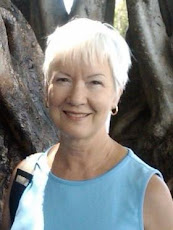

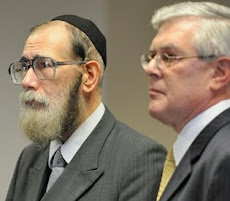

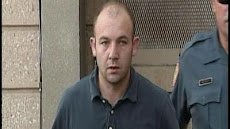









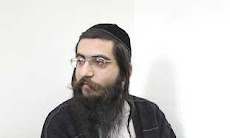





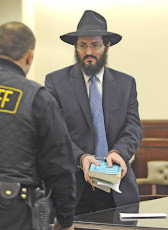














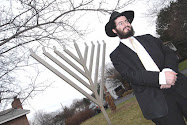




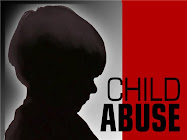













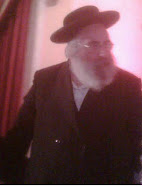



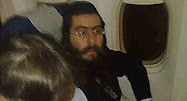




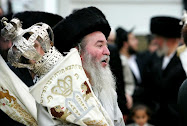


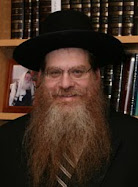












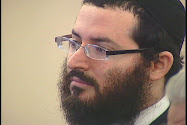
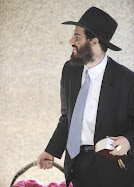
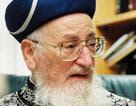









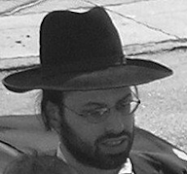

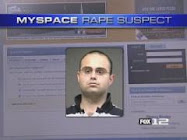









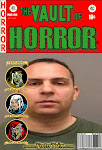












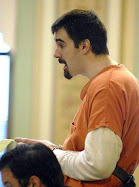


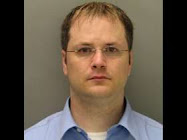


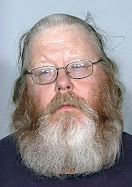

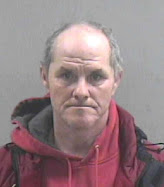
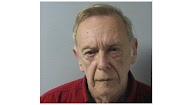
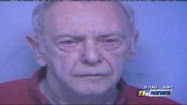













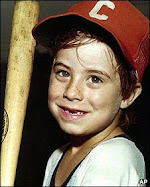

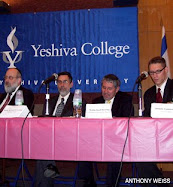





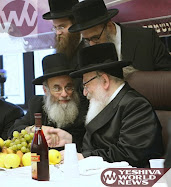
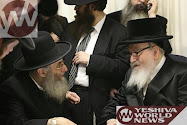
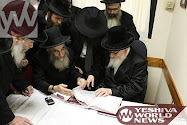









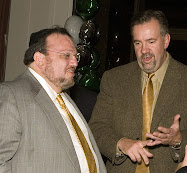
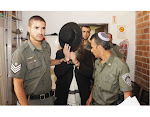



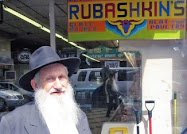















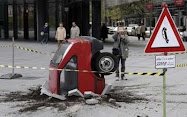










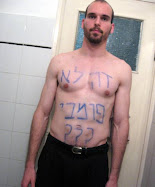
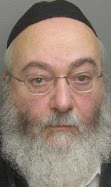

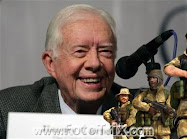










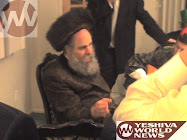






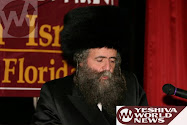


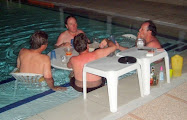

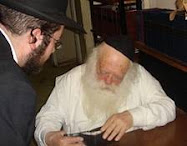

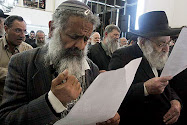





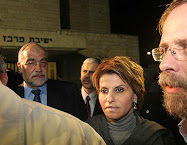
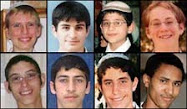
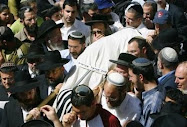
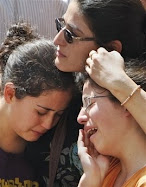
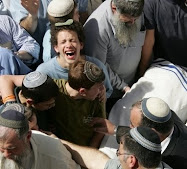
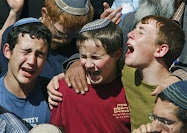
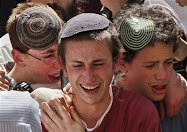










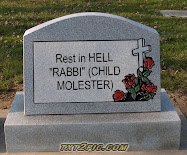








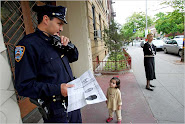















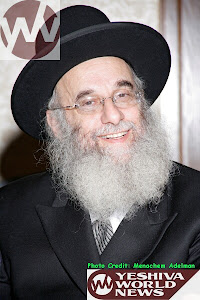

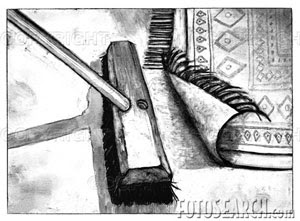
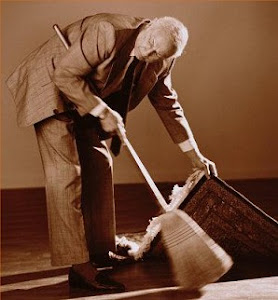








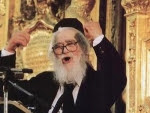
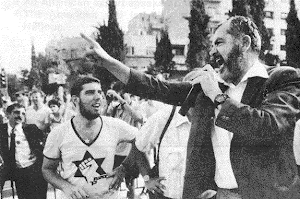
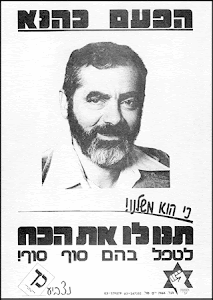
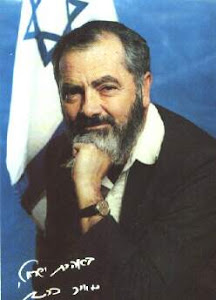
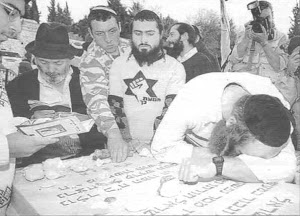
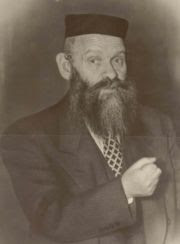




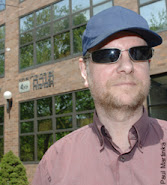


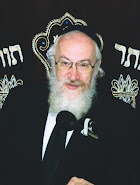





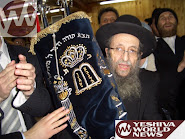

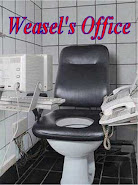

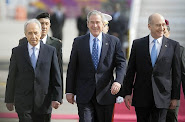
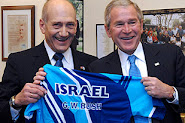
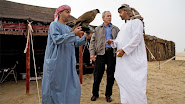


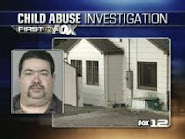
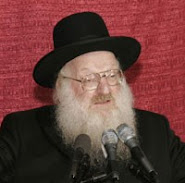

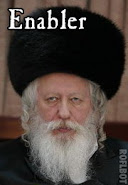



















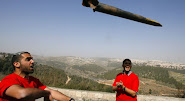
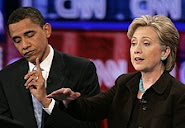


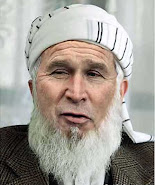









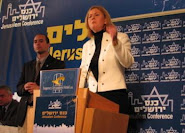


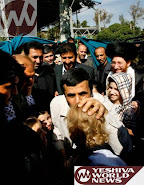
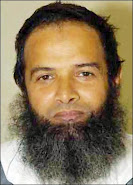


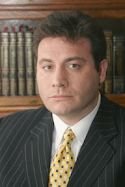


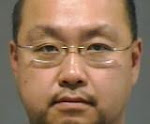
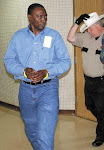

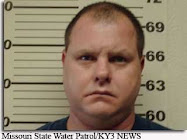



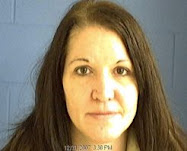


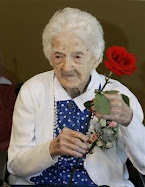
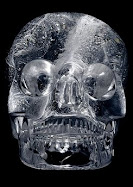
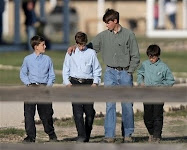



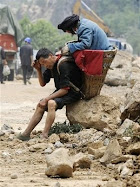





60 comments:
From UOJ Blog
Anonymous said...
With all due respect for the gr8 rabbi and your desire to limit corespondence to the loss at hand, where are the thousands that should come out to mourn the loss of hundreds of yiddishe neshomes to rabbinic molestation? Have you an inkling as to the multitudes of molestation victims banging down the doors of professional counselors outside our community in search for desperately needed healing? Why is it that NO ONE in the Ultra O community has taken a loud public stand on the issue forcing victims to seek refuge by such MO greats like rabbis Blau and Schachter? Where are the UltraO gedolim and askonim? Where are the common folk. The dead and dying neshomas ruined by our perverted mechanchem don't ever get recognition of loss. We are not a light unto the peoples. We have fallen to the depths where we now look up at the christian faith which has faced its sexual issues albeit by force and we have yet to attain that level of repentence. On tisha B'Av we bemoan the loss of our mikdash and wail over the fact that boys were raped en masse. Yet today we couldn't give a damn!
1:44 PM, January 07, 2008
Rabbi Shlomo Drillman
A Glimpse at Tziddkus: A Look at Rabbi Shlomo Drillman
By: Benjamin G. Kelsen
Posted: 10/26/04
How does one sum up or describe the life of an individual like Rebbe U'Mori HaGaon HaRav Shlomo Elimelech Drillman, zt"l, in but a few pages? Were I to write five hundred pages, even a thousand, it would still be insufficient; I would still not be able to touch upon even simply a description of the many events of note that occurred in Rebbe U'Mori's life, to reveal even a glimpse of his Gadlus and Tziddkus. Still, I will try, with a heavy heart and tears in my eyes, to make, what I assure you, is an inadequate and incomplete attempt in these few meager paragraphs, to give a sense of this tremendous individual whom I am privileged to call "Rebbe."
HaRav Drillman's life was one that brought him into contact, placed him in the forefront, of so many of the historical events of the last 80 years. I remember how he told of his trips to Washington or his meeting Prime Minister Begin and Albert Einstein, and of his experiences in the darkness of the Holocaust (several of which are recounted in Dr. Yaffa Eliach's "Hasidic Tales of the Holocaust") I remember so clearly how Rebbe U'Mori would tell over the story of how he became a talmid of HaGaon HaRav Elchonon Wasserman, zt"l hy"d; of his walks to the Hudson River with The Rav, zt"l, late at night, after seder was over. I remember how he related with such pride the time that he was given the privilege of accompanying his rebbe to the home of the famed Rav of Vilna, HaRav Chaim Ozer Grodzenski, zt"l, to visit with HaRav Grodzenski and HaRav Aharon Kotler, zt"l. (Recently, the Beis Medrash Govoha of Lakewood, the yeshiva established by HaRav Kotler, zt"l, sent out a copy of a photograph of HaRav Kotler and HaRav Wasserman that according to the caption was taken in Vilna. HaRav Drillman told me that this picture was taken on the trip to Vilna that he took with Reb Elchonon.)
I remember as though it were yesterday the story that HaRav Drillman would tell us every year on Parshas Zachor, that of Reb Elchonon's experience with a dybbuk in the late 1920's. When the story of Reb Elchonon's death was related each year on the anniversary of his murder, HaRav Drillman would have tears in eyes as he would tell of Reb Elchonon's last statements, and, invariably, so would the listeners because each of these stories were told in such a way that the listener could almost imagine themselves being transported into the actual events.
HaRav Drillman was a person for whom truth was the yardstick by which he would measure everything. A statement would never be made, a "sevora" never suggested, or a "chiddush" never put forth, unless it could be said that it was truthful. "Emes atoh hu rishon..." he would tell me. I remember one time in the shiur, a moment of which I am still very proud, that I had suggested that perhaps we could understand a particular achron in a certain way based upon a statement made in another masechta. HaRav Drillman paused thoughtfully for a few moments and then began to nod his head slowly.
"I don't know if what you are saying is correct," he said, "because we can never know for sure what was in the mind of a person who is no longer with us. However, what you are saying seems emesdik."
I was puzzled by the use of this term until Rebbe U'Mori explained that too often suggestions are made which do not fit in with the facts as we know them, that people sometimes try to read things into the text that do not fit in with the facts. Such a "chiddush" was not "emesdik."
Those who were present at HaRav Drillman's hesped for his Rebbe, The Rav, zt"l, will remember a different facet to his pursuit of the Truth when he became infuriated by those who pervert the teachings of The Rav, zt"l, for their own agendas, on either side of the spectrum. To attempt to usurp The Rav's legacy for one's own agenda was both unfathomable and repugnant to him. In his eyes, one had to remain committed to Emes even if it meant rejecting a particular outlook that was personally appealing.
However, HaRav Drillman, zt"l, was much more than simply an excellent story teller or a seeker of truth. He was an individual for whom the teaching of Torah was of primary importance, for whom being a melamed was everything. What is it that made him unique as a rebbe? What is it that made HaRav Drillman stand out among so many other gedolim?
HaRav Shlomo Elimelech Drillman, born in a small town in Germany, was a prodigy whose great brilliance was discovered by the great Gaon HaRav Elchonon Wasserman, zt"l hy"d, who brought him to his yeshiva at the age of 12. Rav Drillman became quite close with Rav Wasserman, and the mashgiach at the Yeshiva, Rav Yisroel Ya'akov Lupchenski even living in the Rosh Yeshivah's home for several years. Several lifelong friends were made in Baranovich, among them HaRav Shmuel Birnbaum, shlit"a, the Mirrer Rosh Yeshiva. Shortly before the outbreak of the Second World War, Rav Drillman went to learn with Reb Baruch Ber Leibovitz in Kaminetz and remained there until the beginning of World War Two. At the onset of the war the Drillman family fled to Siberia where they his until the end of the war.
In 1946, Rav Drillman came to the United States with his mother and siblings and where reunited with his father, a rebbe in Yeshivas Torah Vodaath, who had come to the United States before the war. Upon his arrival, Rav Drillman presented himself to Rav Yosef Dov Soloveitchik, zt"l, at Yeshiva University with a letter of commendation from Rav Wasserman. He was immediately accepted into the Yeshiva. Upon receiving semicha from RIETS, he was appointed as a rebbe at B.T.A., the Brooklyn division of YU's high school. When B.T.A. closed its doors, he was appointed as a Rosh Yeshiva at RIETS, where he remained until his first stroke shortly after Sukkos in 1997.
Dozens of shuls, yeshivos, batei medresh, chessed organizations, mikvaos, and restaurants; the signs of a thriving Jewish community is the Flatbush that we all know today. What most people do not realize is that Flatbush might not be what it is today had it not been for Rav Drillman. In addition to his role at RIETS, he served as the rabbi and spiritual guide of the Glenwood Jewish Center, one of the first observant synagogues in Flatbush, for almost forty years.
At RIETS Rav Drillman was the director of the fourth year Halacha LeMaaseh program, meeting every single one of his semicha students, thereby touching the hearts of an amazing amount of people. Rav Drillman was known for his tremendous intellect, spanning all walks of secular knowledge in addition to his incredibly vast encyclopedic breadth of Torah knowledge as well. In addition to his intellect, HaRav Drillman was famous for the warmth he exuded towards those people with whom he came in contact.
I believe that HaRav Drillman's uniqueness was the way in which he became an absolute part of the lives of his students. This can be seen in the first real conversation that I had with him, one which I will never forget. It was the third day of the z'man in Elul of 5750 (Fall 1991) and I had just started in the shiur two days before, having just returned from learning in Kerem B'Yavneh in Eretz Yisrael. I was having difficulty finding a chavrusah. I had a friend in another shiur and I thought that perhaps I would switch shiurim in order to learn with my friend. I went in to HaRav Drillman's office in Furst Hall at approximately 10:00 a.m. that morning and said that I wanted to tell the rebbe that I would be switching out of his shiur. When he asked me why I told him that I could not find a chavrusah for the morning seder.
"Pull up that chair," he said, motioning to one of the empty chairs in his office.
"With all due respect to the rebbe," I responded, "I don't want to discuss the issue, I simply wanted to inform the rebbe myself of my plans."
"Who wants to discuss anything?" he said with that famous twinkle in his eye and that mock frown that quickly transformed into a beautiful smile on his face, "We have a lot of ma'arei mekomos to go through and not much time. Now sit down and let's get started."
I was fortunate enough to spend the next six years learning with HaRav Drillman, privately, in his office. It was here that I was given the opportunity to get a glimpse into the nature of this person, this man who had dedicated his life to Harbotzas HaTorah.
HaRav Drillman's taught me to be an "oheiv Yisroel." He loved all Jews, regardless of their background or current level of observance. If he disagreed with someone or felt that there was something wrong with someone, his criticism always included at least one positive comment. "There are very few people who are truly all bad, so always look for the good in them, especially if you think that you see the bad," he taught me. In this he was a great role model. He was one of the first rabbonim to venture into the Flatbush section of Brooklyn in the late 1940's when it was not considered a place for B'nei Torah. As mentioned above, much of what Flatbush is today is owed to HaRav and Rebbetzin Drillman and their efforts.
During shiva countless people came to the Drillman home, each with a special relationship with HaRav Drillman that made them feel as though they we were truly important to him. Whether it was HaRav Shmuel Birnbaum, shlit"a, the Mirrer Rosh Yeshiva, who was HaRav Drillman's roommate and chavrusah in Yeshivas Ohel Torah in Baranovich (Reb Elchonon's yeshiva), or the doctor who was an unaffiliated "child of the 60's" before HaRav Drillman took him under his wing (he is now a shomer Torah u'Mitzvos whose children learn in various yeshivos); each had a story or d'var Torah, each had been made to feel unique and special, and each felt a deep connection to HaRav Drillman.
After his family, which was of the utmost importance and of which he was so proud, came his talmidim and colleagues at YU. Those with whom he attended Yeshiva University and RIETS, with whom he learnt with by The Rav, zt"l, or taught with for the five decades during which he was associated with YU had a special place in his heart. When I would visit with him on Sundays and Wednesdays after the onset of his illness he would always send me back to YU with regards to his many friends and colleagues.
"Give my best..." and he would list a plethora of names from the YU community including Rav Berel Rosenzweig, Rav Michael Rosenzweig, Rav Yaakov Rabinowitz, Rav Zevulun Charlop, Rav Chaim Bronstein, Rav Mordechai Willig, Rav Hershel Schachter, and Rav Mayer Twersky. The list would go on and on.
Rav Drillman was always very careful to make sure that I would go to HaRav Lamm's office before the Yomim Tovim to give his regards. Despite my assurances that I would do so, he would call me at home the next day to make sure that I had transmitted the message exactly as he had given it to me. "But did you also wish Gladys (Chernin, HaRav Lamm's secretary) a Gut Yom Tov?" He would demand. "Of course, Rebbe" I would tell him. Only then would he be satisfied.
HaRav Drillman was also famous for his devotion to his students. In Eretz Yisrael I ran into an old friend who told me how much his life was changed when he woke up late one morning in his room in Rubin Hall to find HaRav Drillman standing over him.
"It's time to get up and serve the Boreh," Rav Drillman said, "did you daven yet? Shiur is in a half hour, let's get moving."
"That a Rebbe would care enough about me to come into the dorms changed the entire way that I perceived Torah," my friend told me as we embraced and cried together on Rechov King George in Jerusalem, mourning the passing of our beloved teacher.
This was not the only time that HaRav Drillman had ventured into the dorms. He would frequently go to visit talmidim who were under the weather, one of the few rabbeim to do so. In his mind his position and title did not alleviate him from the mitzvah of bikur cholim, the halachos of which were among the last I was zocheh to learn with him.
Perhaps one of the most important lessons that I learned from HaRav Drillman, zt"l, was the concept of kavod HaTorah and kibud rav. HaRav Drillman was fiercely dedicated to the honor and memory of his rabbeim and the Torah that they loved. Once, behind the closed door of his office while I waited in the hall, he chastised a well known Rabbi for not visiting his rebbi, who was ill. "Every thing you are, you owe to him! Everything that is yours is his! How can you not go?"
In the same way, all that I am, I owe to him; All that is mine, is his. I miss his presence every hour of every day. I think of the Torah that I gained from him and all of the Torah that time did not allow us to learn together. I cannot imagine not being able to ask him to explain a Tosfos or a Reb Chaim or to hear his famous shiur on Parshas HaShavuah ever again. "No matter what you do in life, remember your true mission: always try to teach Torah and the Derech Hashem to others," he told me when I told him of my decision to attend law school. Rebbe, I will try to make you proud.
To understand the trauma of losing one's rebbe one need only speak to the talmidim of HaRav Drillman. "I have lost a father" one of my friends wrote to me after the funeral. The challenge to the all of us is to ensure that HaRav Drillman's memory not be forgotten in the our Yeshiva, that we not forget this Gaon who spent nearly fifty years in our Beis Medresh, that the sound of the tekiah that he sounded on Rosh Hashana every year from his retirement from his shul until his illness inspire us to fulfil and carry out his legacy to be ovdei Hakadosh Baruch Hu, to strive for perfection in ourselves and our learning.
I am sure that just as Reb Elchonon promised his talmidim in a forest in 1941, as they stood over what they knew would be their mass grave, "The Avos are waiting at the gates of Shomayim and the Shivtei Koh will escort us in to the Beis Medresh shel Ma'aleh to take our seats with the Gedolim of the past as we hear shiur from Moshe Rabbeinu himself," so, too, they were waiting to escort our beloved Rebbe, our father and our Zayde, into that same Beis Medresh where he has taken his place among all of those Gedolim who came before him. Yehi Zichro Baruch.
Rabbi Benjamin G. Kelsen, Esq, an alumnus of Kerem B'Yavneh, YC '94, CSL '97; RIETS '00; Yadin Yadin '06, and a practicing attorney, is a noted speaker and lecturer, author of "The Wisdom of Solomon" and the forthcoming "From the Fruit of the Vine," A Conspectus of the Sermons of Rabbi Chaim Yaakov Goldvicht, zt"l, Rosh Yeshiva, Yeshivat Kerem B'Yavneh and "The Internet and Halachah," an overview of the halakhic issues arising from modern technology. He has worked for the Beth Din of America, and is currently preparing their certification program for attorneys wishing to practice before the Beth Din.
Shmuel Berenbaum
From Wikipedia, the free encyclopedia
(January 2008)
Please help improve this article by adding citations to reliable sources. Unverifiable material may be challenged and removed.
Rabbi Shmuel Berenbaum (March 1922[citation needed] – January 6, 2008) was the Rosh Yeshiva of the Mir yeshiva in Brooklyn, New York City which includes an elementary school and a high school, as well as its post-graduate Talmudical Academy.
[edit] History
Rabbi Berernbaum was born in Poland in 1922 and was a student at Ohel Torah Yeshiva in Baranovich, led by Rabbi Elchonon Wasserman. He later studied in the Mir Yeshiva located in the town of Mir, Poland. At the onset of World War II, he traveled with the rest of the Mir Yeshiva to Vilna, Lithuania, where they remained for three weeks, awaiting visas to travel abroad. After receiving destination visas to Curacao, a Dutch protectorate in the Caribbean, they were given travel visas by the Japanese Consul in Kaunas, Chiune Sugihara. The yeshiva traveled across the Trans Siberian Railroad to Vladivostok in a trip that took over 2 months. From there they traveled to Kobe, Japan, where they remained for 7 months before being settled by the Japanese Government in Shanghai, China.
Rabbi Berenbaum traveled with the remnants of the Yeshiva to the United States where they settled in their current location in Brooklyn, NY. There he became engaged to the eldest daughter of Rosh Yeshiva, Rabbi Avrohom Kalmanovitz. In 1952, after the passing of his father-in-law, he became the Rosh Yeshiva of the Mirrer Yeshiva together with his brother-in-law Rabbi Shraga Moshe Kalmanovitz. He led the yeshiva for the next 56 years, teaching thousands of talmidim during that time. He was known as a sharp witted scholar, and would not hesitate to call out to those whom he felt were not up to their standards. He was vehemently opposed to yeshiva students going to college, and in the later years banned it outright.
Rabbi Berenbaum died on January 6, 2008, at his home in Brooklyn, NY from medical complications due to stomach cancer, aged 85. His body was flown to Israel for Burial.
January 8, 2008
Shmuel Berenbaum, 87, Talmudic Scholar, Is Dead
By THE ASSOCIATED PRESS
Rabbi Shmuel Berenbaum, a Talmudic scholar who for more than 50 years led a major Orthodox yeshiva in Brooklyn, known as the Mir Yeshiva, died on Sunday. He was 87.
His death followed a long struggle with cancer, said Rabbi Pinchos Hecht, executive director of the yeshiva, also called the Mirrer Yeshiva Central Institute.
The Mir Yeshiva is exclusively devoted to the study of the Torah, the first five books of the Bible. It has 1,200 members. Another branch is in Jerusalem, with an estimated 4,000 students. In contrast with other Orthodox and Hasidic traditions, it shuns all music, song and dance in the belief that secular learning is useful only for earning a living.
Rabbi Berenbaum was born in Poland and studied in a yeshiva in Mir before World War II. As the Nazis rolled across Eastern Europe, he and other yeshiva students fled to the Soviet Union and resettled in Shanghai. From there, they eventually emigrated to the United States.
Steven Bayme, national director of contemporary Jewish life at the American Jewish Committee, said the yeshiva helped preserve “a world that was otherwise lost.”
“The rescue of the institution during the Holocaust by going to Shanghai was an act of incredible daring,” Mr. Bayme said. “It took enormous courage and perseverance.”
Jonathan Rosenblum, director of Am Echad, an advocacy group in Israel that works to build bridges between ultra-Orthodox Jews and others, said that while Rabbi Berenbaum had no public position in America, “he was the one who was consulted on anything connected to Torah learning in the Torah world,” adding, “He taught Torah for over 50 years, and he never repeated himself.”
Leadership of the Brooklyn yeshiva will pass to Rabbi Berenbaum’s nephew, Rabbi Osher Kalmanowitz.
Kosher food now available at Florida Panthers games
Pushcart vendor to start selling kosher food Tuesday evening, when Panthers host Pittsburgh Penguins at BankAtlantic Center in Sunrise
Associated Press
Published: 01.07.08, 18:17 / Israel Jewish Scene
A new snack option at Florida Panthers home games will be kosher.
A pushcart vendor will start selling kosher food Tuesday evening, when the Panthers host the Pittsburgh Penguins at the BankAtlantic Center in Sunrise.
A Margate rabbi came up with the idea. Rabbi Paul Plotkin of Temple Beth Am is a Panthers season ticket-holder.
The Miami Dolphins, the Philadelphia Eagles, the New York Mets, the Baltimore Orioles and the New Jersey Devils also sell kosher food at their arenas.
Avi Shafran doesn't care about Johnathon Pollard. Child molestation doesn't seem to bother him at all. Agudas Yisroel of America have not lived up to their commitments on Pollard. Shafran's attack on blogs and the internet is one sided and deliberately misleading. What a jerk he is!
---
Shas to appeal US president for Pollard's release
Deputy PM Eli Yishai to hand Bush Rabbi Ovadia Yosef's appeal for Israeli spy's release. Granting request, implied Shah, will guarantee Prime Minister Ehud Olmert the party's support regarding future gestures to PA
Roni Sofer
Deputy Prime Minister and Shas chief Eli Yishai said Monday that he plans to give US President George W. Bush – through Prime Minister Ehud Olmert – a letter form Rabbi Ovadia Yosef appealing for the release of Jonathan Pollard.
Pollard, a former US Naval civilian intelligence analyst, was sentenced by the US to life imprisonment in 1986, after being convicted for espionage. The Israeli government did not act on his behalf until the mid 1990s, when he was granted an Israeli citizenship, and acknowledged as an Israeli spy.
Anger
Esther Pollard: Ministers' promoting release of Barghouti appalling / Sharon Roffe-Ofir
Wife of imprisoned Israeli agent slams ministers who called for Fatah leader's release as part of future prisoner swap deal. 'It's outrageous that they are now willing to fight for a terrorist who has Jewish blood on his hands,' she says
Full Story
Yishai said Shas is willing to make political gestures in exchange for pollard's release, he told Ynet: "Freeing Pollard will help create a national consensus when the time comes for political progress… I, for instance, have objected in the past to releasing (Palestinian) prisoners, but should the US release Pollard, it would be hard for us to object to gestures given to (Palestinian president) Abbas."
As the negotiations with the Palestinians regarding the core issues, Israel will have to consider goodwill gestures towards them making Olmert's need for Shas' support in the coalition greater.
Olmert further needs Shas' support, as he gears up for the publication of the final Winograd report on the Second Lebanon War. As gestures go, Olmert had the Ministry of Religious Affairs reestablished on Sunday – and headed by Shas' MK Yitzhak Cohen.
Meanwhile, Pollard's wife, Esther, criticized on Sunday statements made by Israeli ministers according to which they would consider releasing jailed Fatah leader Marwan Barghouti in the framework of a future prisoner swap.
"Over the past 23 years I haven't heard even one minister call for Jonathan's release… it's outrageous that they are now willing to fight for a terrorist who has Jewish blood on his hands," she said.
The Jerusalem Post Internet Edition
School offers hope to potential US yeshiva dropouts
MICHAL LANDO, Jerusalem Post correspondent , THE JERUSALEM POST Jan. 6, 2008
A new partnership between the educational arm of Chabad and a technical training college will give haredi youth in New York who are at risk of dropping out of yeshiva an alternative course of study where they can learn a trade within an Orthodox environment.
Starting this fall, the new Jewish vocational training school - a partnership between Chabad and International Bramson ORT - will offer boys aged 16-20 looking for an alternative to the traditional yeshiva education a morning curriculum of yeshiva studies and afternoon vocational training.
Students who do not have a high-school diploma will emerge with a GED (general equivalency diploma), and all students will earn a certificate in their chosen area of concentration and an associate of arts degree.
Students will be trained in high-demand fields such as accounting, computer graphics and medical assistant positions. ORT's job placement department will work to place students upon graduation.
'For the last five years, I've been looking for ways to help students who are not naturally suited for a yeshiva program," said Rabbi Nochem Kaplan, director of the Chabad-Lubavitch Education Office of Merkos L'inyonei Chinuch. "The haredi community needs an alternative for people who think differently, we are not made from a cookie cutter. A youngster struggling to fully understand Talmudic logic, the basis of all yeshivot, does he deserve to be penalized?"
Programs that combine vocational training and Torah study required intensive care and financial wherewithal to survive, said Kaplan. Analyzing the weaknesses of past programs for this population has shaped and strengthened the new venture, according to Merkos and ORT.
Past attempts at vocational training failed in part because of parents' reluctance to entrust their children's education to groups that had little experience creating an environment suitable for yeshiva students. Chabad will maintain complete authority over the Jewish studies, and will ensure that ORT's trainers are sensitive to the needs of Orthodox Jews.
"There are many programs for students who excel, and lately many creeping up for learning disabled, those totally fallen between the cracks, but there's nothing now for a decent student who doesn't fit the mold," said Rabbi Avraham Wolovik, assistant principle for Cheder Chabad in Monsey. "There are students who don't have the ability to dedicate the entire day to studying Torah, and for that there is nothing out there."
Wolovik, who previously taught in a yeshiva, said that over the years he had witnessed many disgruntled students. "A lot of the issues we've been dealing with would have been helped if they had some satisfaction with their work, something more than learning," he said.
Today, Wolovik said, a certain percentage were dropping out of high school. Some find jobs, others go "way off yiddishkeit," and others go on to yeshiva and are struggling. Though the school is a Chabad initiative, it is intended to serve the entire haredi spectrum.
"We not selling any particular brand, the need is acute and every segment in the haredi community is looking for this," said Kaplan. "We expect there will be some who question how the yeshiva functions, but not a lot; everybody is looking for this."
A Metropolitan Council on Jewish Poverty study found that the 30% of Jews living at or near the poverty level in New York City are largely immigrants, elderly and Orthodox. "We thought it was very appropriate for us to start a program to try to make a change in this situation," said Dr. Ephraim Buhks, director of Bramson ORT College and US ORT operations. Yeshiva dropouts who are not given alternative training are at greater risk for financial instability.
'Today the dropout rate is astounding," said Buhks. "In the past no one wanted to admit it, now there is more realization and acceptance that those students need to be prepared for the future; families with many children will be at a level of poverty and there is no other way."
The two leaders, Kaplan and Buhks, agreed they had enough in common to make this collaboration work.
'Over the course of many months we hammered out an agreement that made sense for him, for us and the Jewish community at large," Buhks said. Established more than 125 years ago in St. Petersburg, Russia, ORT began as an organization to help Jews living in the Pale of Settlement to acquire skills to move to cities and get jobs.
Since then it has grown to become one of the largest tech training organizations in the world, with roughly 300,000 students spread over 30 countries.
Currently, ORT Operations USA directs Bramson ORT, a two-year college with facilities in Brooklyn and Queens, as well as post-secondary technical schools in Chicago and Los Angeles. It also maintains computer centers in Miami, Cleveland, and Atlanta.
"The ORT mission continues to be to help low-income people, so it is quite natural for us to move into this area and address the needs of the Orthodox community," said Buhks. "We as ORT will try to stay away from differences among the Orthodox communities. We won't be involved in religious or ideological disputes, we want to help the entire community and everybody is welcome."
But Buhks is well aware of the challenge at hand. He expects that most of the students who enroll will have "weak" academic skills.
"We will have to provide continuous tutorial services," said Buhks.
To do so, the school will make use of the ORT E-Learning Center, which currently helps yeshiva children with after-school tutorials in a range of subjects, including math, Hebrew, biology and standardized testing.
'I was concerned that Chabad wouldn't like students learning regular courses like history, but Rabbi Kaplan thought it was necessary to open students to the society they will work in and didn't insist on isolation," said Buhks. "The most important thing for us is to help as many Orthodox as possible, but we can't satisfy everyone."
Scroll to Mr. Bush Reminds Him of His Historic Role
1 Shevat 5768, 08 January 08 05:34
by Hillel Fendel
(IsraelNN.com) A historic document is planned to be submitted to visiting US President George Bush upon his arrival this week, calling upon him to choose to be remembered like Cyrus, and not like Nebuchadnezzar.
The document, grandly transcribed on parchment and furled into a scroll, is addressed to the the "Leader of the West." It reminds President Bush to "declare to the world" that he will honor G-d's word and act "towards settling the Jewish People throughout their entire Land."
The document was signed by three figures, including the world-renowned Torah scholar, philosopher, social critic and author Rabbi Adin Steinsaltz, once termed by Time magazine as a "once-in-a-millennium scholar." Rabbi Chaim Richman, representing the Temple Mount movements, and Dr. Gadi Eshel of the New Jewish Congress are also signed upon the proclamation.
The scroll is likely to be presented to Mr. Bush during his visit this week to Israel by a prominent political and social figure.
Bush Can Choose His Historic Record
The impressive document includes a detailed reminder to Bush that he has the chance to help G-d's eternal word be fulfilled, and thus pave the way for world peace, or to take the opposite path.
It begins by saying that Mr. Bush can "make a declaration, as did Cyrus, King of Persia... who, in the year 538 BCE, returned the exiled nations to their lands, recognized the full right of the Jewish people to reestablish their Holy Temple, the “house of prayer for all nations” (Isaiah 56:7), and called upon them to return to their land."
"And thus," the manifesto continues, "if you truly desire peace and benevolence, and you would be counted in the company of the truly righteous, we call upon you to declare to all the world: The Land of Israel was bequeathed to the nation of Israel by the Creator of the world. Neither could I, as a son of my faith, nor the Muslims according to their faith, ever take away even the slightest grain from the Eternal’s gift, which He gave to His people Israel, the eternal people."
The Wrong of a Palestinian State
Bush is thus also bidden to declare, "I cannot simultaneously support the establishment of a foreign state for an alien nation in the Land of Israel, and I will not lend my hand to this wrong."
The proclamation also takes a foreboding tone: "Or – Heaven forbid – you can choose the second option – to willfully aid in the destruction, under the guise of peace! You certainly know what the G-d of Israel did to Egypt and Assyria and to all Israel’s enemies from time immemorial: Do you imagine that you will be able to save yourself if you have come to implement a plan that intends to steal the land of “the people that survived the sword” (Jeremiah 31:1), and to cut off those who survived the Holocaust, to rob the land that was given to them by the Creator?"
"All of the peace treaties and initiatives which have been based upon the decisions of the government of Israel, indeed the entire Oslo process, and the ‘Disengagement,’ and the establishment of a terrorist state within the Land of Israel known as ‘Palestine’ – regrettably, all of these agreements are the result of a lack of sufficient faith in the Divine promises that the Lord made to the patriarchs of our nation, and all that is written in the Torah of Israel.
"Understand this well: the nations of the world cannot excuse their actions and their decisions on account of the weakness of Israel and her government. G-d ordained that the role of the nations of the world is to strengthen the nation of Israel. This will benefit all humanity and bring about world peace, as the prophets have foretold.
"Do you imagine you can escape from the struggles in Iran, Pakistan, Saudi Arabia, Syria, Egypt, and Lebanon, by offering up sacrifices of the Jews who are slaughtered daily by their enemies who speak of peace but live by the sword?
Bring Pollard With You!
The document also includes a call for Bush to allow Jonathan Pollard to return home to Israel - either on the same plane to Israel as the President, or by "authoriz[ing] his immediate release while you are yet in Jerusalem, before you return to the United States. This will be a positive step that will build confidence."
The document also provides a list of Biblical verses "for meditation" that "testify to the eternal promise and the inexorable link between the land of Israel and the Jewish people." The entire document is posted for viewing and reading on the TempleInstitute.org site.
Rabbi Dov Stein, secretary of the Sanhedrin, which is headed by Rabbi Steinsaltz, met on Monday morning with a public figure and presented him with the scroll, asking that he please submit it by hand to Mr. Bush during their upcoming meeting.
The latest Avi Shafran rantings and ravings "Danger in the blogosphere" is riddled with venom and hatred, ridiculous comparisons, and a cowardly dangerous "Spokesperson" who compares an incident occurring on the internet that led to the suicide of the victim to support his so called theories of how evil and dangerous cyberspace is. However, Shafran conveniently leaves out the benefits of the internet especially on such a crucial topic of sexual abuse in the Jewish communities. Sure if you use the internet for bad it can have severe side effects. But so can a loaded pistol.
Shafran takes the Torah route defense". He inserts his "evil loshon hara" and motzei shem Rah defense. Problem with Shafran's distortions of the truth are it excuses and allows alleged child molesters to thrive in abusing more innocent souls. That's a risk we cannot afford to take.
Apparently; Avi Shafran takes a different approach that risking children's lives is of minor relevance to society and to all Jews. What is is he living in amnesia world? Now say a kid reports he was molested by his "Rabbi" and the "torah giants" intimidate the victim and the family of the victim into keeping quiet. And what happens when these same "rabbis" also threaten against reporting to police? What happens when The Yeshivah which employs the accused "rabbi" don't even conduct an investigation into the matter, and they continue to allow the accused child molester to work with children? What happens when they go on as if a child's life means nothing at all to them? What do you say to such specimens who are the "roshei yeshivas" or the "das torah" who have such disregard for human life?
Shafran can't even get to first base - thats because of his repeated evasiveness and denials on what common sense people are able to detect, conclude, and determine on their very own - without acting or being in a robotic state of mind all the time.
Does the internet pose dangers? Yes. But, that's with almost anything. Danger can lurk everywhere. What happens when an innocent bystander gets hit by gunshots and dies. Is buying groceries dangerous? No. But the victim was at the wrong place wrong time. Now is a gun bad? Should we outlaw guns all together? Guns are dangerous aren't they? Guns kill people so therefor we should make it illegal to own a firearm? But what about if the gun is used in self defense. aren't you allowed to kill one who tries to kill you?
The internet has its drawbacks like everything else. However its pros outweigh the cons considerably. That's why people make their own determinations and draw their own conclusions based on the information feed. Same for all media outlets. Newspapers, radio stations, television, cable, etc. They can pose certain dangers. You judge the information you gather from your sources and make your own judgments.
what does history show? It indicates the obscurity in which Shafran tries to plant in reasonable people. Shafran wants to protect himself and others. You think he cares about the actual truth? His steadfast denials of even acknowledging the facts speaks volumes on his ill character. Someone who plays "Russian roulette" with peoples lives; thats a individual that deserves to be ridiculed and scorned upon. And someone who very much fits that modes operandi is "Rabbi" Avi Shafran. How sad!
This is an excellent idea. We ought to build villages too. Separate ones of course. One for the males and another for the females.
--------------
Rabbi: Segregate male and female teachers
Beit El's rabbi, Shlomo Aviner, calls for segregation of sexes at work orientations, seminars; explains, 'We must behave as we teach our children to behave'
Kobi Nahshoni
Female and male teachers must be separated at the workplace, according to Rabbi Shlomo Aviner, the rabbi of the settlement of Beit El, north of Jerusalem.
"Those who educate our children in schools where the sexes are segregated must practice what they preach," he said.
Aviner made the remarks in his weekly article in a synagogue pamphlet entitled, "With Love and Faith."
Some of the questions the article dealt with included: "Is it acceptable to hold orientations with both male and female teachers? Co-ed workshops? One teachers' lounge for both sexes? Field trips or work seminars with members of both genders?"
In his response, Rabbi Aviner said that "a major rule in the Torah is that men and women must keep very far from one another. Not just distance themselves in a moderate way, but keep far from each other."
According to the religious leader, "these principles apply to all Israelis, all the more so for those who have taken upon themselves the holy mission of educating children and Israel's young about the Torah and the mitzvot."
The rabbi said he believed an answer to above mentioned questions "was almost not required" and ruled that work seminars and orientations must be segregated by sex.
Conditions for co-ed activities
In the rest of the article, Aviner lists the six conditions that stipulate when it is acceptable to hold co-ed encounters "when there is no other choice": In a lecture where men are sitting in the front of the lecture and women are seated in the back, places of rest and ceremonies, the discussions should be segregated and co-ed discussions, if they are held, should be very business-like.
"The seating of male and female teachers together is an educational necessity," the rabbi explains, "thus it is important to make sure that everything is very businesslike and not social, that only professional matters are discussed, the teachers are not seated in a circle but rather around a table, men on one side, women on the other and they should not tell jokes or stories."
Aviner said the atmosphere in work seminars should not be pleasant, social or friendly, especially if the same group frequently returns to meet over a long period of time and stresses that "sometimes some women may dress in a manner that is not modest – which causes sin and embarrassment.
"What we see as right for male and female children, we must first practice ourselves," the rabbi concluded.
I'm not a horses ass. Avi Shafran sweeps under the rug like I do, so what? A Rabbi must always be believed over a child!
The Jerusalem Post Internet Edition
Background static
avi shafran , THE JERUSALEM POST Jan. 8, 2008
Winter, when my commute home from Manhattan on the Staten Island ferry is shrouded in darkness, provides me with a singular opportunity.
That's because the thousands of other commuters sailing along with me are more subdued than at other times of year. There is, of course, artificial lighting on the ferry, but the darkness outside seems to quell conversations somewhat; the boat is noticeably quieter than when the sun sets later. And where the electric lights are most dim, in a certain part of the vessel unknown to many passengers, is where you will find me.
I use my commute to study Talmud and catch up on reading. In the winter, the study is particularly sweet in that poorly lighted, somewhat remote area, where the only other passengers are interested exclusively in napping or listening, eyes closed, to their iPods.
A small, battery-operated booklight clipped to the cover of the tractate I study casts soft light onto the page, and, unless one of my neighbors is intent on annoying the rest of us by turning up the volume on his "personal" audio-device so it sounds like an angry bee (and no doubt permanently damages his eardrums), all is quiet and dark, with the Hebrew words before my eyes drawing me in. I wouldn't come home any other way.
AT AN Agudath Israel national convention several years ago, Rabbi Mattisyahu Salomon, the Mashgiach, or dean of students, of the famed Lakewood Yeshiva (Beth Medrash Govoha), delivered an address that I often recall as I settle into my ferry-seat. His topic had been the centrality of introspection and focused study to the essence of true Jewish life, dedication to the Divine. And then he bemoaned how chronically unconcentrated we all are these days.
When incandescent lighting was first commercialized in the 1920s, Rabbi Salomon recounted, committed Jews - like the rest of the world - were enthralled with the possibilities presented by the new technology. They saw wondrous potential in not having to rely on the dim, flickering light of wax candles or oil lamps to illuminate the sacred books whose study they so cherished.
But the revered Torah personage Rabbi Elya Lopian (1872-1970), a giant of the Mussar movement that stressed striving for personal ethical perfection, was less sanguine. He told his students that the more primitive lighting to which they were accustomed, for all its drawbacks, facilitated concentration and focus. The new technology, he feared, for all of its advantages, would undermine those things.
WE DON'T generally think of our well-lighted spaces as impairing concentration, but the logic is unquestionably there. The more informational input to the senses, the less mental focus. That is, after all, the point behind darkened arenas and spotlights. Our brains are wonderfully able to filter out much that might distract us from tasks at hand, but the extraneous information is still there even if we don't consciously notice it, background static to our contemplations.
Every time I turn on my little light on my winter commute home, I appreciate Rabbi Lopian's prescience anew.
Rabbi Salomon went on to add the telephone to the list of erosions to deep thought. How often are not only our dinners but our reflections rudely interrupted by ringing or warbling or trilling? And the more mobile the technology, he noted further, the more opportunities for our concentration to be broken. Anyone who has silently cursed his cell phone knows just what the rabbi meant.
"Something that looks like a blessing," he recapped, "can be, in fact, a disaster." The glut of available information came to mind, and the dubious marvel of multitasking. Then, moving on to the options for travel in modern times, he mused sadly, "Today we are expected to be everywhere."
How sadly true. In pre-automobile times, people were rarely, if ever, expected to travel beyond the confines of their immediate towns or neighborhoods. With options so limited (and towns so small), there was more time to stay put, sit still, stay focused. Many of the things that pull us, unresisting, into our cars and onto our highways, around the corner and around the world, may be worthy ones, but that cannot change the fact that they take us away - from our homes, from our families, and from study and introspection, the pillars of Jewish existence.
RABBI SALOMON was not asking his listeners to return to horses and buggies or oil lamps. He is no Luddite and has no disdain for technology. No, he is simply an exquisitely sensitive observer, someone who sees a broader picture than most of us do. He challenges us to open our eyes to what we have lost, even as we have gained. The losses are tragic, even if so subtle that most of us don't even realize what we are missing.
Rabbi Shafran is director of public affairs for Agudath Israel of America.
N.Y. Jewish leader Isaac Trainin dies
Published: 01/08/2008
Rabbi Isaac Trainin, a New York Jewish federation leader for more than a half-century, has died. He was 88.
Trainin worked for the UJA-Federation of New York and its precursor for 55 years, starting as its director of religious affairs in 1952.
At the federation he helped found the Metropolitan Coordinating Council on Jewish Poverty, the Jewish Community Relations Council of New York, the Coordinating Council on Bikur Cholim and the Jewish Alcoholics and Chemically Dependent Persons program. The bikur cholim council now carries Trainin's name.
“Both as our house rabbi and through his deep caring and commitment to our agency network, Ike’s vision for the Jewish people continues to inspire and guide us today,” said a joint statement by UJA-Federation of New York President John Shapiro, Chairman Jerry Levin and Executive Vice President and CEO John Ruskay.
Chabad.org
Terror Victim's Son Celebrates Bar Mitzvah at Western Wall
Dean Teremforush, who lost his mother in a terrorist attack five years ago, holds a Torah scroll at the Western Wall after his bar mitzvah, which was organized by the Chabad Terror Victims Project.
Dean Teremforush, who lost his mother in a terrorist attack five years ago, holds a Torah scroll at the Western Wall after his bar mitzvah, which was organized by the Chabad Terror Victims Project.
By Tamar Runyan
Jan 8, 2008
Flanked by his father and siblings, Dean Teremforush, 13, proudly read from the Torah in front of Jerusalem's Western Wall. Conspicuously absent, however, from the bar mitzvah service – one of several arranged in the last few weeks by the Chabad Terror Victims Project – was the boy's mother, who perished five years ago in a terrorist attack southeast of Tel Aviv.
On May 7, 2002, a suicide bomber struck a Rishon Lezion club, wounding 55 and killing 15, including Anat Teremforush. Her husband, Danny Teremforush, still suffers from leg injuries sustained in the attack.
"Danny makes every effort to be both a father and mother of his children," said Rabbi Menachem Kutner, director of the terror victims project.
Besides the Monday bar mitzvah, the terror victims project – which assists families of Israeli terror victims –a trip around Jerusalem for the Teremforush family and a tour of the Western Wall tunnels. At the celebration, Kutner personally presented a new prayer shawl and set of tefillin to the bar mitzvah boy.
According to the rabbi, the ceremony – which marks a young man's age of maturity in Judaism – was very joyous, a fact illustrated by the family's dancing and singing at the event.
"Dean was very happy," said Kutner. "He felt that this was something very special."
But the ceremony was not without its painful moments: At the end of the service, the children recited Kaddish, the traditional mourner's prayer, for their mother.
Kutner said that his organization's work with the Teremforushes, as with the more than 2,600 families that must cope with the loss or injury of a loved one as a result of a terrorist attack, goes beyond arranging lifecycle celebrations.
One year for Sukkot, the initiative – which operates under the umbrella of the Chabad-Lubavitch Youth Organization in Israel – provided the family with a sukkah and plenty of food when it found out that Anat Teremforush would host the entire family for the holiday. Volunteers make visits on Purim and deliver matzah on Pesach.
Said Kutner: "We're here so that they know that they are not forgotten and alone."
FPIF Commentary
Bush's Israel Problem -- And Ours
Ira Chernus | January 8, 2008
Editor: John Feffer
Comment on this article
Foreign Policy In Focus
www.fpif.org
No one knows what’s in George W. Bush's mind as he heads off for Israel and Palestine. Perhaps he himself doesn’t know exactly why he’s making the trip. But if he is really going to burnish his legacy by moving both sides closer to peace, as the pundits say, he faces enormous problems on both sides.
Among Palestinians, the Fatah leaders Bush is willing to talk with speak for only a segment of their people. A recent poll showed 39% of Palestinians trusting Mahmoud Abbas’ Fatah party. Only 16% trust the opposition Hamas Party. But 41% say they do not trust either faction. Even if Abbas concludes some kind of deal with Bush and the Israelis, he may be a leader who looks over his shoulder and sees only a small band of followers.
If such a deal really creates a Palestinian state, more Palestinians may jump to the pro-Fatah side. But the deal is bound to create a rather truncated state with limited independence, as chunks of land around Jerusalem are officially ceded to Israel or the Palestinians are denied a full-scale army and full control of their water supply. Bush supports Israel’s insistence that the democratically elected Hamas leaders must be excluded from the government. So, many Palestinians will see any deal as a sell-out and resist. How many, and how they will resist, no one can predict. But it’s predictable enough that Palestinian society will end up more fractured and its government less able to govern.
This chaos is probably just what the Israeli government wants. According to many reports, Israeli undercover agents helped found Hamas years ago to undermine the then-nearly-universal Palestinian support for Yasser Arafat. Then the Israelis pumped money (and perhaps arms) to Fatah during its internecine war with Hamas to intensify the inner Palestinian split. To further sow dissension, the Israelis used massive violence to break up the prospect of Fatah-Hamas unity in 2006.
Israeli governments have pursued such divide-and-conquer strategies ever since the state was born. What the Israelis have always feared more than anything else is a unified opponent. And on the Israeli side, fear more than anything else is the obstacle to peace. That is George W. Bush's Israel problem -- and ours.
The Politics of Fear
Last month a well-respected rabbi in my community, Tirzah Firestone, wrote a moving public confession. Like most Jews, she “had been raised with the unquestioned narrative about Israel's righteousness.” She first began to question when she visited the Occupied Territories. “I encountered the shocking effects of my people's fear,” she writes. “Fear has been inculcated into us Jews. It lives in our cells.” By now, fear has become “the sovereign power in our lives, and [it] justifies any action.”
As a trained psychologist, the rabbi knows that people who build walls around themselves for safety end up reinforcing their fear. “What an incredible metaphor this ‘security barrier’ [which Israel is building in the West Bank] is for our own lives!” she writes. “The danger of our barriers is a kind of sclerosis of the soul, a deadening of our humanity.” The fear comes from a history “full of real trauma and suffering, centuries of expulsions and pogroms, ghettos and methodical extermination.”
But even sympathetic critics of Israeli policy usually fail to point out what every Palestinian knows all too well: Jewish fear comes from, and perpetuates, a confusion between past and present. Jews have been far too quick to identify Palestinians with Nazis, to equate isolated bombings in an Israeli bus or café with the methodical killings of the Nazi holocaust. Jews have become victimizers because they have never ceased seeing themselves as victims.
Indeed, the influential Jewish theologian Emil Fackenheim once quoted an Israeli psychologist who said that so many Jews equated all Arabs with Nazis because they have “entered a holocaust psychosis.” Fackenheim offered this quote to support his claim that the Israeli occupation of Palestine, and all the violence it entailed, was not merely a moral but a sacred act.
Israel has spent nearly 60 years showing conclusively that Jews not only can fight back but can make themselves invincible in the Middle East. Yet the fact that Israel is militarily secure has not taken away the fear. It just does not sink in to the minds of most Jews, in Israel and elsewhere.
Why not? One intriguing speculation came recently from the always insightful Israeli commentator Uri Avnery. When the U.S. intelligence community announced that Iran was not pursuing a nuclear weapon, Avnery wrote that the news that Israel was not in danger of an annihilating attack fell “like an atom bomb” on that country. The Iranian threat was, he said “our most precious possession.”
Beneath the irony he revealed a grim truth: “Jews have become used to anxiety. We have little red warning lights in our heads, which come on at the slightest sign of danger. In such a situation, we feel at home. We know what to do. But when the lights stay off and no danger appears on the horizon, we get the feeling that something suspicious is going on. Something is wrong.”
In other words, fear has become a foundation stone of Jewish identity. Indeed, too many Jews define what it means to be Jewish largely in terms of persecution, oppression, and the need to resist anti-Semitic enemies. Without an enemy to fight they would be plunged into an identity crisis.
Fear as Foreign Policy
The Israeli government feeds this fear by insuring that there will always be an enemy. Once it was all Arabs, then all Palestinians, then the PLO. Now it is Hamas. The Israelis have a long history of ignoring Hamas offers for peace, insuring that Hamas will be retained as an angry foe.
Now they’ve done it again. In the last few weeks Hamas leader Ismail Haniyeh and others have proposed a long-term truce. Although certain forces in the Israeli government are urging that truce talks begin, Israeli Prime Minister Ehud Olmert has publicly vetoed the idea in no uncertain terms. And Israel has stepped up its attack in Hamas-ruled Gaza.
Fear has prevailed again in the dominant Israeli view, as Avnery sums it up: “If the Palestinians are strong, it is dangerous to make peace with them. If they are weak, there is no need to make peace with them. Either way, they must be broken.” And if (as is likely) they will not be broken, Israel gets to have two strong factions continuing to tear Palestinian society apart. For fear-driven Israelis, it’s a win-win situation.
This fear helps to explain not only the many Israeli policies that are violent and outrageous (“Those Arabs understand only one thing: Force”) but the few that are now in the direction of peace. In a recent interview, Olmert shocked his nation by saying publicly that Israelis must take seriously the prospect of dividing Jerusalem. But he quickly explained that it has nothing to do with wanting better relations with the emerging Palestinian state. On the contrary, Olmert views his primary responsibility as prime minister as “ensuring a separation from the Palestinians.”
Israelis have become obsessed with the fear that, if the occupied territories are not somehow jettisoned, Palestinians will some day outnumber Jews. The idea of letting them have the right to vote, and thus rule over Jews, is too terrifying to accept. But how can Jews “live eternally in a confused reality where 50% of the population or more are residents but not equal citizens who have the right to vote like us?” Olmert asked. “My job as prime minister, more than anything else, is to ensure that doesn't happen."
Olmert’s talk of flexibility on Jerusalem may look courageous. He knows that an undivided Jerusalem has become the prime symbol of the Jewish people taking an intractable stand against their enemies. What Rabbi Firestone, or any good psychologist, could tell him is that people who feel compelled to prove their inflexibility (like people who wall themselves in) only root themselves deeper in their anxiety.
Olmert also knows that Israeli leaders who do not create an appearance of intransigence that caters to the fears of their public will soon be voted out of office. So at the same time that he shocked Israelis by hinting about dividing Jerusalem, he shocked Palestinians by insisting that the huge settlement of Ma’alei Adumim, built in the West Bank, must remain part of Jewish Jerusalem. And his government further outraged Palestinians when it announced that it would build 1,000 new units in the settlement Har Homa, which Israel plans to keep as part of its Jerusalem (even though Israel’s attorney general says it’s illegal). When Condoleezza Rice said, “This doesn't help to build confidence," it was quite an understatement.
Olmert knows one more thing: Right-wing politicians recently forced through a law that says fully two-thirds of the Israeli parliament must approve any changes in the boundaries of Jerusalem. So he can safely sound conciliatory, knowing that the concession he hints at will probably never come to pass.
Negotiating a Two-State Solution
The limited independence the Israelis will probably offer now might have been widely welcomed in Palestine and paved the way to real peace -- if the Israelis had offered it back in 2000 when Bill Clinton tried to broker a final peace. But just as the talks came near to the point of agreement, then-Prime Minister Ehud Barak backed out. He was overtaken by fear -- not of the Palestinians, but of his political opponents on the right, who were busy scaring Israelis into seeing an independent Palestine as Nazi Germany reborn.
Seven years of war and occupation have passed since then, terribly lean years for the Palestinian people. Fewer of them are now willing to accept a two-state solution at all. The movement for a single, secular, binational state -- the ultimate terror for most Israeli Jews -- has now taken deep roots and gained widespread support among Palestinians and their supporters.
A two-state solution might still win over the Palestinian public, if it requires Israel to remove all but a few of the settlements, gives Palestine full control over all of the West Bank and Gaza including all of Arab Jerusalem, and offers real independence, including a genuine army and full control over water. And it would have to be ruled by the government the people elected, including the full complement of elected Hamas officials.
But the fears of Israeli Jews are powerful enough to insure that no Israeli government that agrees to such a deal can survive. That is Bush’s Israel problem.
Why is it also our problem? Listen to Karen Hughes, Bush’s close friend and former undersecretary of state for public diplomacy. After two years trying to understand how to improve America’s image in the Muslim world, Hughes found that “the Iraq war was usually the second issue that Muslims and Arabs raised with her, after the long-standing conflict between Israel and the Palestinians. Hughes said she advised Bush and Rice two years ago that U.S. help in ending the six-decade old fight over Israel would probably do more than anything else to improve the U.S. standing worldwide.”
Restoring U.S. Reputation
If indeed anger in the Muslim world poses a threat to our national security, nothing will make us more secure than helping to bring peace between Israel and Palestine. That will require a just peace, creating a genuinely independent, genuinely viable Palestinian state. And that, in turn, will require Jews overcoming their fears.
The good news is that there have always been Jews, in Israel and around the world, who have escaped the grip of fear. Here in the United States many are joining the proliferating Jewish peace groups. Though these groups are still small, their numbers are growing rapidly, and their impact can be great. As they grow, their voice will reach the several million Jews who do not really believe the fear-driven alarms sounded by right-wing Jewish institutional leaders. The fear that grips those several million is the fear of speaking their conscience, despite the harsh criticism they may endure.
The more Jews speak out now for a just peace, the more they will make their view a legitimate option in the mainstream Jewish community. That is the key to breaking through the widespread fear-induced silence. And that, in turn, is the key to taking genuine steps toward peace for Israel and Palestine and greater security for the United States.
Ira Chernus is professor of religious studies at the University of Colorado at Boulder, author of Monsters To Destroy, and a contributor to Foreign Policy in Focus (www.fpif.org).
http://www.ndtv.com/convergence/ndtv/story.aspx?id=NEWEN20080038024&ch=1/8/2008%202:13:00%20PM
School gives TC for complaining sexual abuse
Sam Daniel
Tuesday, January 8, 2008 (Chennai)
It's not often that children complain of sex abuse but what happens when they muster enough courage to report.
Well schools give them Transfer Certificates and send them out. That's what a school run by an NGO near Chennai has been doing, when a few of its teachers were accused of abusing children.
A class X girl student is shattered. Her teacher allegedly molested her last year but when she complained, she was forced to leave the school.
And a boy said he was hit on his head with an iron rod by the head master because he had allegedly seen him in a compromising position with a lady worker. So he was denied a TC and with no option he works in a local bar.
While the school has not even probed these allegations, both victims have now approached the Indian council for child welfare. A German agency that sends funds to NGOs in Chennai too has complained.
''Many teachers are quite bad there and they behave badly with girls. One teacher abused me,'' said one of the girl student.
''A teacher who had allegedly molested a girl continues to teach there, that's our biggest concern now,'' said Jan Uwe Burmeister, Yoga Vereihigung, Germany.
According to research, only 12 per cent of child victims report abuse. Experts say a new breed of perpetrators are creeping into schools and orphanages to abuse children and penalising kids for reporting abuse will only make things worse for them.
Vidya Reddy Tulir, Chennai said, ''If you don't investigate, the abuser will keep abusing more and more children and that is scary.''
With pressure mounting, the NGO has now agreed for a probe but says it's a plot to harass them.
''We will not shield anyone but we will not make anyone a scapegoat too, to save the organisation or to satisfy the whims and fancies of someone sitting somewhere,'' said T S Venkataramani Honorary Coordinator, Sevalaya.
While reporting child abuse has turned life into a nightmare for two kids, one of them has turned into a child labourer. And it shows how difficult it is even for academicians to understand that child abuse could happen right in their backyard.
http://www.news.com.au/mercury/story/0,22884,23026886-3462,00.html
Ward sex-abuse claims 'ignored'
Article from: The Mercury
NICK CLARK
January 09, 2008 12:00am
ALLEGATIONS of sexual assault at the troubled Launceston mental health ward 1E were ignored because of the perceptions about the mental state of the complainants, an independent review has found.
Australian College of Mental Health Nurses president Peter Santangelo made the finding in a report handed down yesterday -- the second review of the facility since 2003.
Previously the Health Complaints Commission found three cases where staff had had sex with former patients, and also a bullying culture.
The Santangelo review was sparked by further allegations of sexual assault early last year, about which police were unable to find sufficient evidence to lay charges.
In the latest report, Mr Santangelo said ward 1E staff were inconsistent in their interpretation of what constituted a serious incident.
Health Minister Lara Giddings said she had asked Mental Health Services to remedy the inadequacies in response to sexual assault.
"We can do things better when it comes to sexual assault," she said.
"We need to treat every one of them as serious even though you may be dealing with people who have a mental illness and may even be fantasising about something.
"What we need to do is investigate every allegation because it could be true.
"What has happened in the past is that some people have wiped them away and said 'oh no, that's just part of the illness and we do not need to worry about that'," she said.
From now on all complaints would be investigated and the police brought in, she said.
Mr Santangelo said there were some "very negative aspects to the culture" in the ward, which required good leadership to overcome.
He made 38 recommendations which would aim to change the embedded culture.
Director of Mental Health Services associate professor Des Graham said he was concerned allegations of sexual misconduct may have either not been reported or dismissed without investigation.
A formal policy on sexual conduct and staff response to complaints had been drafted and a no-tolerance approach would be taken, he said.
"There needs to be further work done on enhancing the culture of ward 1E," he said.
Ward 1E handles 600 patients a year.
Liberal health spokesman Brett Whiteley said the audit showed the department had failed to respond to the 2003 abuse allegations.
"I am horrified that ward 1E abuse allegations raised last year were treated with such disdain by the Mental Health Service," he said.
The department had failed to respond to allegations.
Avi Shafran is an honorable hypocrite!
Hampton-Dumont teaching assistant charged with sexual abuse
Associated Press - January 8, 2008 1:14 PM ET
HAMPTON, Iowa (AP) - A teaching assistant and assistant softball coach at Hampton-Dumont High School is accused of having sex with a student last summer.
Tyler Radcliffe of Hampton is charged with third-degree sexual abuse and sexual exploitation by a school employee.
Radcliffe has been on paid administrative leave since October when school officials learned of the alleged incident.
The charges were filed in Franklin County District Court last week. Radcliffe made his initial appearance in court yesterday, where a preliminary hearing was waived.
Information from: Brian Fancher/KGLO-AM, http://www.kgloam.com
Fairmont Man Pleads Guilty to Sex Abuse
Charles Heffner
Photo Credit: WVRJA
Charles Heffner could spend up to 35 years in jail.
FAIRMONT -- A Fairmont Man was in court Tuesday morning, to face charges of sexually assaulting a young girl.
Charles Heffner, 71 pleaded guilty to one count of sexual abuse by a parent guardian or custodian and one count of incest.
Marion County Circuit Court Judge David Janes sentenced Heffner to 15 to 35 years behind bars and required him to register as a sex offender when he is released.
http://www.silive.com/news/index.ssf/2008/01/staten_island_dad_pleads_guilt.html
Staten Island dad pleads guilty in death, sex abuse of his infant son
by Staten Island Advance
Tuesday January 08, 2008, 6:03 PM
Advance file photoStaten Islander Joseph Wallace, 21, is escorted to a court appearance last year.
A Staten Island man swapped a jury trial for a life sentence when he admitted to killing his baby, putting an abrupt halt to a disturbing case of sex abuse.
Joseph Wallace, 21, of Port Richmond, pleaded guilty today to second-degree murder and second-degree aggravated sexual abuse in the death of his 2-month-old son, Joseph A. Wallace, Jr.
Under the agreement, Wallace faces 15 years to life in prison on the murder charge and 10 years on the count of aggravated sexual abuse. Wallace must also register as a sex offender.
Justice Robert J. Collini said he would set the sentences to run concurrently.
Wallace is due back at state Supreme Court, St. George, Jan. 28 for sentencing.
The infant's mother, 18-year-old Alyse Connors, returned from work to the couple's Jewett Avenue apartment on May 17 last year and found little Joseph Jr. naked and unresponsive, lying on a bed between the legs of his passed-out father.
The boy was pronounced dead at Richmond University Medical Center, West Brighton, about an hour later.
An autopsy revealed the infant died from internal bleeding caused by a blow to the right side of his head. The baby boy had also suffered lacerations and bruising of his rectum, police said.
Wallace was arrested Aug. 16 in the wake of the city medical examiner's findings.
Under police questioning, Wallace admitted he inserted two fingers into the boy's rectum, "moving back and forth two minutes," in an attempt to keep the baby quiet.
Wallace also allegedly told police he had been drinking "heavily" at the time.
-- Contributed by Jeff Harrell
This female teacher has no brains. At least go to a boiler room or somewhere more private.
Texas High School Teacher Charged With Sexual Abuse Of A Child
(January 8, 2008)—Shannon Kay Hrozek, 42, was on paid leave Tuesday from her job as an English teacher at Westfield High School in the Spring ISD after she was charged with sexual abuse of a child in an incident involving a 16-year-old male student.
According to court records, an assistant principal entered her classroom after school last Thursday and found her performing oral sex on the boy.
The teenager said she had told him to come back to the classroom after school.
A janitor who noticed that the teacher and the student were in the room with the lights off notified the assistant principal, court records showed.
Horzek was free Tuesday on $50,000 bond.
She’s scheduled for a court appearance on Wednesday.
It’s the third incident in the last four months in which Spring ISD teachers have been charged with having sex with students.
The only people who know the truth for sure, are the alleged victims and the accused. We must give the benefit of the doubt to the accused child molester, especially when they are Rabbi's.
---------------------------------
Kids claim sexual abuse by the hands of babysitter
Posted: Jan 8, 2008 01:04 PM
Updated: Jan 8, 2008 04:05 PM
BY ROBERT GARRISON
RGARRISON@KJCT8.COM
GRAND JUNCTION (KJCT)- A Grand Junction man is under arrest after four kids under the age of 11, told authorities he had sexually assaulted them on several occasions.
David Diesburg, 22, of Grand Junction was arrested on Monday and booked into the Mesa county jail.
Investigators said Diesburg was a "family friend" of a divorced woman who had recently moved from Iowa to Grand Junction and he baby-sat her four girls, from time to time.
According to the arrest affidavit, the kid's family left the children with Diesburg and returned to Iowa in early January for about a week. The couple said they had learned of the abuse while in Iowa.
The four children claim Diesburg would play games of a sexual nature with them; one incident of forced sexual intercourse was also alleged in the affidavit.
The suspect admitted to most of the allegations, the affidavit said. Saying he touched the victims more the 50 times and had sex with one of the victims, as recent as Saturday.
Diesburg is facing 13 felony child sex assault charges
If they come after me I will continue to plead ignorance. If that doesn't work I will commit suicide rather than have my kovod taken away from me!
---
Priest Sex Abuse Trial
Burlington, Vermont - January 8, 2008
Jury selection is underway in another civil suit filed by a former altar boy who claims Vermont's Roman Catholic Diocese failed to protect him from a pedophile priest.
Last month, a jury found that the Vermont Catholic Diocese should pay damages for failing to protect a teenage parishioner from an abusive priest 30 years ago. Now, another trial is about to start. And the same priest is at the center of the accusations against the Diocese.
John Perrotte, 41, and his lawyers declined comment as they entered the courthouse. They were there to select a jury for Perrotte's lawsuit seeking financial damages from Vermont's Roman Catholic Diocese.
"In this case, two instances of inappropriate sexual contact between a priest in the Diocese and Mr. Perrotte when he was 14 years old in St. Anne's Parish in Milton. It happened in 1980," explained Perrotte's lawyer, John Evers.
Perrotte claims the sexual predator was former Vermont priest Alfred Willis. Last month, a civil trial jury determined that the Diocese did not protect another former teen parishioner from Father Willis three decades ago. The award in that case was $15,000.
Perrotte will be seeking much higher damages. He claims confidential Diocesan documents prove that former Bishop John Marshall-- who died 15 years ago-- knew Willis was a pedophile, but moved him from church to church without warning parishioners or parish priests.
The Diocese disagrees. In response, it claims there is no evidence that the Diocese was negligent. Church lawyers also claim Perrotte waited too long to file his suit.
Jury selection is Perrotte's case could be complete by week's end. The trial is scheduled for next month. The Diocese is appealing the $15,000 award in last month's trial. But it has already paid more than $1 million in damages to settle out-of-court with two other men who claimed they were sexually abused by former Vermont priests. And there are at least two dozen more abuse lawsuits waiting for trial.
Brian Joyce - WCAX News
Sullivan man sentenced for sexual abuse
Monticello – A Liberty man was sentenced in Sullivan County Court in Monticello Monday to 3½ years in state prison and three years’ post release supervision on his conviction for sexual abuse in the first degree.
Orlando Santiago, 45, was arrested after a criminal investigation by the Village of Liberty Police after the victim’s mother reported the incident.
Santiago entered a guilty plea and admitted to sexually touching an eight-year-old child in the Village of Liberty last July, said Chief Assistant District Attorney James Farrell. Santiago was also ordered to register as a sex offender under Meghan’s Law and an Order of Protection was issued.
My lawyers are doing a good job stalling the legal process.
Harvest man faces 72 counts of child sex abuse
Tuesday, January 08, 2008
From staff reports
A Harvest man has been arrested as a fugitive from California where he faces 72 counts of child molesting.
An ongoing investigation between Huntsville police and the Riverside County, Calif., Sheriff's Department has led to the arrest of Victor Ung, 47, of 295 Blue Creek Drive, said Huntsville police spokesman Wendell Johnson. Ung is charged with 72 counts of molesting a family member.
He has been living here and working as a computer engineer at a local company for the past four years.
Riverside authorities have set a $1 million bond for Ung. A fugitive from justice, he is being held in the Madison County metro jail awaiting extradition to California.
Athens man arrested for allegedly molesting girl
ATHENS - An Athens man was arrested Friday for allegedly sexually abusing a 6-year-old girl several times.
Doyle Anthony Partrick, 34, of 500 Elkton St. was charged with first-degree sodomy, second-degree sexual abuse and two counts of incest with a minor, said police Capt. Marty Bruce.
The girl reported the incidents to her mother Thursday and the mother called police Thursday night, Bruce said. Detectives Katrina Flanagan and Johnny Campbell found Partrick at his apartment, Bruce said.
The girl was examined Friday at the Children's Advocacy Center in Huntsville.
Partrick was transferred to the Limestone County Jail.
US Jewish leaders call Olmert, express support for two-state solution
JPost.com Staff , THE JERUSALEM POST Jan. 9, 2008
On the eve of President George Bush's historic visit to Israel, senior American Jewish leaders called Prime Minister Ehud Olmert on Tuesday and expressed their support for a two-state solution.
"These are very difficult and complicated times, but we see an opportunity as you see an opportunity to make real progress toward peace," Marvin Lender, immediate Past Chair of the National Board, Israel Policy Forum told Olmert during the 30 minute conference call. "You heard on this call the support of this group and we can assure you that the American Jewish community supports you, as well."
In response, the prime minister assured the leader that he would continue work towards a final settlement with the Palestinians.
"The visit of President Bush comes at a very good time to encourage all the parties involved to continue our efforts to reach a regional understanding to conclude an agreement," Olmert said. "We will do everything we can to make serious and genuine efforts to reach an agreement toward a two-state solution, a homeland for the Jewish people and a Palestinian state for the Palestinian people."
Rav Shmuel Birnbaum zt'l was niftar after struggling with stomach cancer. Please get checked and screened periodically for this deadly disease.
Tuesday, January 8th 2008, 4:00 AM
Sex-rap extradition
A Brooklyn man accused of abusing two Orthodox Jewish teens was brought from Israel to the U.S. Monday, becoming the first person extradited under a treaty that went into effect last January.
Stefan Colmer, 31, is expected to be charged Tuesday with sexually abusing two 13-year-old boys in his Midwood home in 2006, a law enforcement source said. Colmer, who was well known in Brooklyn's Orthodox community, fled to Israel after he learned he was under investigation last February, prosecutors said.
Scott Shifrel
ISRAEL EXTRADITES B'KLYN 'PERV'
By STEFANIE COHEN
January 8, 2008 -- An accused pedophile was extradited from Israel yesterday to face charges he sodomized two 13-year-old boys, the Brooklyn District Attorney's Office said yesterday.
Stefan Colmer, 30, a computer technician, is the first person returned to the United States under a new provision in a treaty with Israel that covers male sex victims. He fled in February after learning he was being probed, and was busted in Jerusalem in June.
The investigation into Colmer began following rumors he had lured boys outside a yeshiva to his nearby home.
The new provision may also allow for the extradition of Avrohom Mondrowitz, who claimed to be a rabbi and posed as a school psychologist in Borough Park during the late 1970s and early 1980s.
He was indicted in 1984 for sodomizing young boys, and fled to Israel after learning he was under investigation. He was recently arrested there, and extradition proceedings are pending.
Brooklyn DA Announces Extradition of Accused Sex Offender from Israel
by Brooklyn Eagle (edit@brooklyneagle.net), published online 01-07-2008
DOWNTOWN BROOKLYN – Kings County District Attorney Charles J. Hynes Monday announced that Stefan Colmer, 31, would return to the United States to face charges he sodomized two 13-year-old boys in his Midwood home in 2006.
Colmer is the first person to be extradited from Israel to the United States under a newly negotiated extradition treaty between the two countries. He is expected to be arraigned Tuesday in Brooklyn Supreme Court.
After learning he was under investigation, in February 2007, Colmer fled to Israel. A new extradition treaty between the United States and Israel, which went into effect Jan. 10, 2007, allowed Colmer to be returned to Brooklyn. Prior to the newly amended treaty, the crimes for which Colmer is charged were not subject to extradition.
The indictment charges that between March and May 2006, Colmer sodomized two teenage boys on numerous occasions.
Colmer is charged with eight counts of Criminal Sexual Act in the Second Degree, eight counts of Sexual Misconduct, 19 Counts of Sexual Abuse in the Second Degree and two counts of Endangering the Welfare of a Child.
The new treaty may also allow for the extradition of Avrohom Mondrowitz, who claimed to be a rabbi and posed as a school psychologist in Borough Park during the late 1970s and early 1980s. He was indicted in 1984 for sodomizing young boys and fled to Israel after learning he was under investigation. Since then, Mondrowitz has remained in Israel, protected by the now-defunct treaty. He was recently arrested there after the treaty was amended, and extradition proceedings are pending.
Assistant District Attorney Elizabeth Doerfler is prosecuting Colmer.
This molester is a real klutz!
MARION COUNTY, Fla. -- A convicted child molester and kidnapper died in prison last month after choking on a hot dog, prison officials said...
If I was being accused of sexual abuse I would swiftly issue an hazmonoh for motzey shaim rah.
-
Man gets 20 years for child molestation
LYNNE HOUGH
Tuesday January 8th, 2008
MILTON — A man who had been accused of trying to entice a child at Navarre Park in 2006 has been sentenced to 20 years in prison on unrelated charges.
Thomas A. Vandegrifft, 28, pleaded no contest Monday to two counts of lewd and lascivious exhibition, two counts of aggravated assault by threat, two counts of child abuse and one count of attempted sexual battery on a child...
Thanks to everyone who donated in the Wikimedia Foundation fundraiser! You can still make a contribution, or buy Wikimedia merchandise.
Shmuel Berenbaum
From Wikipedia, the free encyclopedia
Jump to: navigation, search
Rabbi Shmuel Berenbaum with Rabbi Yeruchim Olshin at a simcha
Rabbi Shmuel Berenbaum with Rabbi Yeruchim Olshin at a simcha
Rabbi Shmuel Berenbaum (March 1920 [1] – January 6, 2008) was the rosh yeshiva of the Mir yeshiva in Brooklyn, New York City which includes an elementary school and a high school, as well as its post-graduate Talmudical Academy.
Contents
[hide]
* 1 History
* 2 Death
* 3 References
* 4 External links
[edit] History
Rabbi Berernbaum was born in Poland and studied at Ohel Torah Yeshiva in Baranovich, led by Rabbi Elchonon Wasserman. He later studied in the Mir Yeshiva located in the town of Mir, Poland. At the onset of World War II, he traveled with the rest of the Mir Yeshiva to Wilno, Poland (now Vilnius, Lithunia) where they remained for three weeks, awaiting visas to travel abroad. After receiving destination visas to Curacao, a Dutch protectorate in the Caribbean, they were given travel visas by the Japanese Consul in Kaunas, Chiune Sugihara. The yeshiva traveled across the Trans-Siberian Railway to Vladivostok in a trip that took over two months. From there they traveled to Kobe, Japan, where they remained for 7 months before being settled by the Japanese Government in Shanghai, China.
Rabbi Berenbaum traveled with the remnants of the Yeshiva to the United States where they settled in their current location in Brooklyn, New York, where he became engaged to the eldest daughter of the rosh yeshiva, Rabbi Avrohom Kalmanovitz.
In 1952, after the passing of his father-in-law, he became the rosh yeshiva of the Mirrer Yeshiva together with his brother-in-law Rabbi Shraga Moshe Kalmanovitz. He led the yeshiva for the next 56 years, teaching thousands of students during that period. His diligence was legendary, he would sit the entire day in the yeshiva's study hall speaking with the young students in learning.
As a policy, he would not attend any functions or weddings until after the afternoon seder in the yeshiva was over. This would cause many weddings to take place late in the evening so as to allow him to officiate. He opposed his yeshiva students going to college, and later banned it outright.[citation needed]
[edit] Death
Rabbi Berenbaum died on January 6, 2008, at his home in Brooklyn, NY from medical complications due to stomach cancer, aged 87. His funeral, held on January 7, was attended by thousands of mourners. [2] His body was flown to Israel for Burial.
All indications are that Harav Shmuel Berenbaum zt'vkl was a true Torah Giant of his generation. Not only knowledge wise of the whole torah kulah - but also living it and breathing it with empathy,compassion, and caring for each fellow Jew as if it were his own flesh and blood.
Rav Berenbaum Z'tl suffered physical ailments. He had a heart condition. About 10 years ago he almost had a brush with death because of it. He collapsed . When he came to; he asked if he indeed was still in haolam hazeh. When told that he was - he pronounced out loud "ki aim chayenu v'oyrech yumeinu."
And then he was tested by the ribono shel olam with yene machalah! Radiation. Medical procedures. Blood tests. Weakness, nausea, pain. Yet, throughout his declining health, this true gadol went about his righteous life with humility and dignity and with kovod hamokom and kovod abriyus all coming in the same package.
Harav Berenbaum Z'tl had a faulty heart in the physical sense. In every other sense of the word, he had the heart of a lion!
This is pure Loshan Harah. One is mechuyev to disregard what is written and said about him.
----
Pedophile suspect extradited from Israel charged in NY
Michal Lando, jerusalem post correspondent , THE JERUSALEM POST Jan. 9, 2008
A suspected Brooklyn pedophile extradited from Israel to the US under a revised extradition treaty was arraigned and held on $10-million bail on Tuesday.
Stefan Colmer was indicted by a Brooklyn grand jury on charges that he sodomized two 13-year-old boys from the haredi Jewish community in Brooklyn where he lived.
To avoid arrest, Colmer, a computer technician and salesman, fled to Israel, where he has been hiding under the name David Cohen.
A revamped extradition treaty between the United States and Israel, which went into effect January 10, 2007, allowed Colmer to be returned to Brooklyn. Prior to the newly amended treaty, Israel and the US had agreed to extradite suspected sex criminals only if they had been charged with rape. Since last January, at least two other sex offenders have been extradited, including Michael Leon Zeve and Kenneth Frank.
"Until now, Israel has been a Mecca for sex offenders," said Vicki Polin, founder and executive director of The Awareness Center, the international Jewish Coalition Against Sexual Abuse/Assault.
The indictment charges that between March and May 2006, Colmer sodomized two teenage boys on numerous occasions, after luring them to his home from a nearby yeshiva high school, according to the US extradition request.
Colmer is charged with eight counts of criminal sexual acts in the second degree, eight counts of sexual misconduct, 19 counts of sexual abuse in the second degree and two counts of endangering the welfare of a child.
In the Orthodox world, "the status quo has been to protect offenders' parnassa [income] and not shame family members, at the expense of shaming those who have been victimized," said Polin, who has been working in the sexual violence field for 25 years.
The new treaty may also allow for the extradition of Avrohom Mondrowitz, who claimed to be a rabbi and posed as a school psychologist in Boro Park during the late 1970s and early 80s. He was indicted in 1984 for sodomizing young boys, and he fled to Israel after learning he was under investigation. Since then, Mondrowitz has remained in Israel, protected by the now-defunct treaty. He was recently arrested there, pursuant to the amended treaty, and extradition proceedings are pending.
Michael Lesher, an Orthodox lawyer representing six of Mondrowitz's alleged victims and actively pursuing his extradition, has been facing intense pushback.
"I continued to bang on the door about Mondrowitz, but I am operating against tremendous institutional logic," said Lesher. "He should have been first to be extradited years ago. When they arrested Colmer, I think they were testing the waters."
10M bail for man accused of molest
By JOHN MARZULLI
DAILY NEWS STAFF WRITER
Wednesday, January 9th 2008, 4:00 AM
An orthodox Jew extradited from Israel to face charges of sodomizing two teenage boys in his Brooklyn home was ordered held Tuesday on $10 million bail.
Stefan Colmer, 31, allegedly went on the lam last February after he learned he was under investigation for molesting the 13-year-old victims whom he had befriended and invited to his Midwood home to play board games, prosecutor Elizabeth Doerfler said.
Colmer pleaded not guilty to the indictment that could put him in prison for 56 years if he's convicted on all eight counts.
He is the first defendant returned to the U.S. from Israel under a new treaty that defines sodomy as an extraditable offense.
Defense attorney David Epstein said Colmer fled to Israel after receiving threatening e-mails and letters linked to rumors in the community about the alleged sexual attacks.
Colmer's wife and two children remained in Brooklyn while he was on the move throughout Israel using a fake name until authorities arrested him in June.
Colmer, a computer technician and freelance photographer, asked to be placed in protective custody at Rikers Island.
During a short verbal exchange Wednesday at the Ben-Gurion Airport Terminal, Chief Ashkenazi Rabbi Yona Metzger thanked President George W. Bush for the US's military intervention in Iraq.
"I want to thank you for your support of Israel and in particular for waging a war against Iraq," Metzger told Bush, according to the chief rabbi's spokesman...
Bush, Olmert kiss up to Shas, Israel Beiteinu
Gil Hoffman , THE JERUSALEM POST Jan. 9, 2008
Prime Minister Ehud Olmert and US President George W. Bush took steps to maintain Olmert's coalition on Wednesday by flattering Shas chairman Eli Yishai and Israel Beiteinu leader Avigdor Lieberman.
In his press conference with Bush, Olmert was asked about Lieberman's threats to leave the government. He responded by praising Lieberman and his party.
"I hope all the coalition partners stay," Olmert said. "I don't want a political crisis. This government has many achievements, and Israel Beiteinu is part of that. I want them to stay. We have more in common than what divides us."
Kadima sources revealed that Olmert had spoken to Lieberman before he announced on Tuesday that the core issues of the conflict would be negotiated. Lieberman gave Olmert the impression that he could remain in the coalition as long as no subcommittees were formed with the express purpose of dealing with the core issues.
Olmert and Lieberman will meet at the beginning of next week ahead of a decision by the Israel Beiteinu secretariat on Tuesday regarding whether to remain in the coalition.
When Olmert introduced Bush to Yishai on the tarmac at Ben-Gurion Airport, Bush surprised the Shas leader by saying he was looking forward to talking with him at a working dinner set for Thursday night, which Olmert and Lieberman will also attend.
"I understand that during our dinner tomorrow, I'm supposed to have a long and intensive conversation with you to persuade you not to leave the government," Bush told Yishai.
Shas spiritual leader Rabbi Ovadia Yosef told Yishai on Wednesday morning that Israel should not negotiate with the Palestinians, because Palestinian Authority President Mahmoud Abbas has no control in the Palestinian territories.
"Of what use are talks when Kassams continue to land in Sderot and when Israelis are killed by Palestinian security forces in Judea and Samaria?" asked Yosef, adding that "no one is authorized to discuss concessions on Jerusalem."
Rabbi’s Incitement Against Olmert Threatens To Split Apart Chabad
Lubavitch Messianist: Prime Minister Should Be ‘Hanged From the Gallows’
By Nathan Jeffay
Wed. Jan 09, 2008
In a major blow to a decade-long campaign to play down divisions within the Chabad-Lubavitch ultra-Orthodox movement, the sect’s Israeli leadership appears ready to publicly distance itself from a significant messianic strand within the movement.
The unexpected development has been forced on the Chabad leadership by a spreading tide of anger toward the movement this week, after a rabbi from the messianic strand declared that, were Israel properly run, Prime Minister Ehud Olmert would be “hanged from the gallows.”
Rabbi Shalom Dov Wolpe, a Chabad educator and author, launched into a tirade about Israel’s negotiations with Palestinians at the conference of a right-wing organization he runs, S.O.S. Israel.
“The terrible traitor, Ehud Olmert, who gives these Nazis weapons, who gives money, who frees their murderous terrorists, this man, like Ariel Sharon, collaborates with the Nazis,” Wolpe said on Wednesday, January 2, in remarks that were shown on Israeli television news.
A Chabad spokesman in Israel, Moni Ender, lashed out at Wolpe for his comments.
“This is not Lubavitch. Rabbi Wolpe is talking by himself. We have nothing to do with him. He makes dirt for Chabad,” Ender said....
Police: Indict Minister Edri
rebecca anna stoil and jpost.com staff , THE JERUSALEM POST Jan. 10, 2008
Police recommended Wednesday that prosecutors indict Immigrant Absorption Minister Ya'acov Edri (Kadima) for ethical misconduct when he was deputy public security minister from 2003 to 2006.
Wednesday overnight, Edri was quoted by Israel Radio as saying he would resign from the government if he would be indicted.
Edri added that a great injustice has been done to him, and that he would work to protect his good name.
The National Fraud Squad's Northern Desk announced Wednesday that it had concluded its investigation into the "Haifa Rabbinic Court Case" that broke out in the fall of 2006; allegedly, bribes were paid to influence the court's decisions.
Police believe that Haifa Sephardic Chief Rabbi Shlomo Shalush's driver acted as a go-between, giving bribes to the rabbinic court secretary responsible for determining the composition of the rabbinic tribunals, as well as to Rabbi Yigal Krispil, then an adviser to Sephardic Chief Rabbi Shlomo Amar.
Investigators said they had sufficient evidence concerning both Krispil and the court secretary, also a rabbi, to try them on bribery-related charges.
Edri only became a focus of the probe in February 2007 after he arrived at police offices to offer a statement regarding the affair. At the time, representatives of the Fraud Squad said Edri had been asked to offer a statement, and that during questioning, it became "necessary" to question the minister under caution.
After Edri was questioned, investigators he was was suspected of attempting to receive kickbacks. Now, police say, that while serving as deputy public security minister, Edri maintained "unethical" ties to Shalush's driver.
Police have passed the case file - together with recommendations for indictments - to the Haifa district attorney.
Kashrut Certifiers Fight Over Slaughterhouse Turf
By Marissa Brostoff
Wed. Jan 09, 2008
A conflict between supervising rabbis at an embattled kosher slaughterhouse has become public, opening a window into the usually closed world of kashrut certification.
Rabbis who represent K’hal Adath Jeshurun, a small ultra-Orthodox community based in the Washington Heights section of Manhattan, have announced that they will not continue to certify products at the huge AgriProcessors slaughterhouse in Postville, Iowa, because, they said, another rabbi is restricting their access to the slaughtering process. Months of negotiations between KAJ and AgriProcessors fell through at the end of last month.
“We are fully cognizant of the momentous repercussions that our decision entails and can assure that we have not taken it lightly,” the rabbis wrote in a letter to AgriProcessors.
Kosher certification for meat is a complicated process that often involves rabbis from several Orthodox communities taking turns at enforcing slightly different standards of shchita, or kosher slaughtering practice. Members of one congregation will not necessarily eat meat that has been certified by a rabbi from a different congregation.
Because of its size, the AgriProcessors plant requires a great deal of rabbinic supervision; one estimate holds that about 70 rabbis — including slaughterers, or shochtim, and overseers, or mashgichim — help to maintain standards at the company. As a result, a designated head rabbi is placed in charge of certification, and a “super-mashgiach” manages the entire process on the ground. Some organizations, including the Orthodox Union, frequently delegate their oversight of the slaughter to that mashgiach, who is entrusted with upholding the specific standards of each congregation.
Until two years ago, the head rabbi at AgriProcessors was Rabbi Chaim Kohn, who is affiliated with KAJ. Kohn played an important role in the scandal that resulted when People for the Ethical Treatment of Animals castigated AgriProcessors for the practice of ripping out live cows’ throats, which some say is condoned by kosher law.
“Kohn helped PETA to understand that the practice did not violate humane standards,” KAJ president Eric Erlbach said.
Kohn left AgriProcessors shortly after the PETA scandal and was replaced by Menachem Weissmandl, who leads a small community in Monsey, N.Y., known as Nitra, after its birthplace in Hungary.
Here, accounts diverge. According to Erlbach, Kohn was pushed out for reasons connected to conflicts with Weissmandl and the Rubashkin family, which owns AgriProcessors. According to Erlbach, upon taking over, Weissmandl quickly hired a new super-mashgiach on his own payroll and began restricting other rabbis’ access to the slaughterhouse.
“From the time that he took over, we have had less and less control over what was going on, less and less ability to supervise,” Erlbach said. “Our certification is based on our ability to supervise the process. We are not willing to cede that control to Rabbi Weissmandl or to anybody else.”
Weissmandl, for his part, claims that the current super-mashgiach was jointly hired by all the rabbis who are involved with supervision at AgriProcessors, including representatives of KAJ, and that the congregation later made an unreasonable demand: that there be a rabbi with the same amount of authority as the super-mashgiach who would oversee only slaughter performed by KAJ standards and report only to KAJ.
“I did everything possible to have a good working relationship with KAJ,” Weissmandl said. “But the Rubashkins and I felt it would not make sense to have two rabbis running the place.”
KAJ and AgriProcessors began negotiating the issue last October, but on December 28, KAJ leaders sent a letter to AgriProcessors announcing that they would “terminate… supervision of all AgriProcessors’ operations” in April.
AgriProcessors responded publicly with a press release that did not mention KAJ by name but suggested that the company had voluntarily terminated the relationship in order to “consolidate its kashrus supervision” behind the O.U. and Weissmandl. AgriProcessors could not be reached for comment.
It is unclear how much of an impact KAJ’s rescinding its certification will have on AgriProcessors’ sales. The company is huge, and the community is relatively small, although it is possible that the KAJ certification holds prestige for those outside Washington Heights.
“I’d like to flatter myself and my congregation by thinking it’s going to make a huge difference,” Erlbach said, “but I haven’t got the foggiest notion.”
Report Details U.S. Cough, Cold Medicine Abuse
About 5 Percent of Americans Ages 12 to 25 Admit Using OTC Drugs to Get High
By WILL DUNHAM
Jan. 9, 2008—
WASHINGTON, Jan 10 (Reuters) - About 3.1 million Americans ages 12 to 25 -- about 5 percent of that age group -- have at some time used an over-the-counter cough and cold medication to get high, a U.S. government survey released on Thursday found.
These young people are using cough syrups and cold pills in large doses to induce hallucinations, "out-of-body" experiences or other effects, officials said.
The 2006 survey was a snapshot of abuse of these medications among young people, the Substance Abuse and Mental Health Services Administration or SAMHSA said in a report. The results are based on interviews with almost 45,000 people ages 12 to 25, the researchers said.
"The survey tells me that parents need to be very concerned about the over-the-counter medicines that they have in their medicine cabinet," Dr. H. Westley Clark, director of SAMHSA's Center for Substance Abuse Treatment, said in a telephone interview.
"And young adults need to be concerned about the effects that over-the-counter cold medications and cough medications have on their functioning."
Adolescents and young adults are thought to have the highest rates of abuse of such medications, the officials said. Nearly 1 million -- or 1.7 percent of them -- had done so in the past year, according to the survey.....
Man, 34, Faces Possible 500-Year Prison Term
UPDATED: 5:27 pm MST January 9, 2008
PHOENIX -- A former church youth worker has been found guilty of 28 counts of sexual abuse involving three boys over a five-year-period, County Attorney Andrew Thomas said on Wednesday.
James Downs, 34, and all three victims attended New Destiny Christian Church in Laveen, Thomas said.
Downs was indicted on Dec. 13, 2006, following his arrest on Sept. 15, 2006.
Downs was convicted on Tuesday of:
# 14 counts of sexual conduct with a minor under the age of 15. In these counts, the victims are 12 or under and the mandatory sentence is life in prison without the possibility of parole for 35 years per count.
# One count of sexual conduct with a minor under the age of 15. The sentencing range is 13 to 20 years.
# One count of attempted sexual conduct with a minor under the age of 15. The sentencing range is 5 to 10 years.
# 12 counts of sexual conduct with a minor over the age of 15. The sentencing range is four months to one year per count.
The crimes were committed between June 2001 and September 2006, Thomas said.
"By committing these horrid crimes, this defendant grossly violated the trust he was given," Thomas said. "I am hopeful that these convictions, and the fact that this offender never again will be able to harm a child, can bring greater peace and healing to all involved."
Thomas said all of the convictions for counts of sexual conduct with a minor under the age of 15 must be consecutive to each other. That means the minimum sentence on those counts alone would be more than 500 years.
Sentencing is set for Feb. 8.
Psychologist to stand trial in sexual abuse case
By Samantha Yale /Staff Writer
Dr. Fernando Cordero was held to answer Monday on charges that he sexually abused or tried to sexually abuse seven women whom he met in the course of his work as a clinical psychologist with Santa Barbara County and as an instructor of sexology at Hancock College.
According to investigators' testimony during the preliminary hearing, Cordero presented himself as an authority figure to the victims, most of whom were receiving his counseling for mental health issues. He sometimes engaged in sexual activity with the women at his places of work, the investigators said under questioning from Chief Trial Deputy Ann Bramsen.
One of the victims was a student of Cordero's at Hancock College, according to testimony at the hearing in Santa Barbara County Superior Court in Santa Maria.
Cordero, 65, who was previously free on bond, had his bail increased by Judge Zel Canter and was remanded back into jail custody at the conclusion of his preliminary hearing with bail set at $1.1 million.
Case attorneys disagreed on the issue of Cordero's bail, and the topic is set to be revisited at a hearing Monday per Canter's ruling.
Cordero has been placed on administrative leave from his job with Santa Barbara County's Alcohol, Drug and Mental Health Services department.
At the request of attorneys with the state Board of Behavioral Sciences and the Board of Psychology, Canter amended his previous ruling that Cordero may not practice psychology on female patients to include a ban on male patients as well.
Cordero was initially charged by the district attorney's office following his Nov. 9 arrest at his Orcutt home with seven felony counts of sexual assault against one alleged victim, referred to in court for her privacy as Jane Doe 1, and a misdemeanor count against another alleged victim, Jane Doe 2.
He was later charged for a third alleged victim, Jane Doe 3.
On Dec. 13, Cordero was charged for the alleged abuse of four more women - Jane Does 4, 5, 6 and 7.
In all, Cordero is facing 12 felony counts as well as two misdemeanor counts of attempted sexual exploitation by a psychotherapist or drug abuse counselor.
The felony counts consist of: three counts rape by use of duress and under color of authority, one count of forcible rape, one count of sodomy by use of duress and under color of authority, one count of attempted sodomy by use of duress and under color of authority, one count of sexual penetration by foreign object by use of duress of under color of authority, one count of oral copulation by use of duress and under color of authority, one count of sexual battery by restraint, one count of sexual exploitation by a psychotherapist or drug abuse counselor, and two counts of dissuading a witness from reporting a crime.
Cordero is also charged with special allegations that he dissuaded a witness while he was out of custody on bail.
Santa Barbara County sheriff's Sgt. Shawn O'Grady testified Monday that Jane Doe 1 said she had a mental health condition and had received counseling from Cordero for four years. The first six months that she saw him, “everything was fine. There were no problems,” O'Grady said.
After six months, “he began to act strangely, and made sexual comments to her and things of that nature,” O'Grady said. Then the sexual assaults began, he testified.
Cordero told the victim she had to do what he said, O'Grady testified, and the psychologist reminded her he had the power to keep her in or out of jail, he said.
The alleged victim had multiple theft convictions in her past, the sergeant testified on cross-examination by Cordero's attorney Michael Scott.
There was no physical force reported in the alleged sexual assaults of Jane Doe 1, O'Grady also said under cross examination.
Samantha Yale can be reached at 739-2159 or syale@lompocrecord.com.
January 8, 2008
Think those who enabled abuse in the Jewish community will ever own up to their crimes? Think they'll ever come clean? My synopsis is a resounding NO! The gedolim who speak against trivial matters with their full blown rhetoric and new chumrahs - Don't have the guts to face a real issue such as admitting sexual abuse cover up and denials of the past. That should be TOP PRIORITY. It should take center stage. The silence on this and the noise on less detrimental matters is a chait, avlah, and shanda of the greatest magnitude. It is an unacceptable predicament to be in. Do you think the Shafrans, Mandels, Solomons, Krohns, belskys, and margos of the world really care? They care about one thing and one thing only. Maintaing a good image of themselves at all costs - even at the price of destroying and wreaking demolishing Jewish souls!
I'm so fed up with the excuse meisters of the world. Get real. As long as one is still living and breathing they can at least do tshuvah. Part of tshuvah is recognizing the wrongs and apologizing to those who were
hurt.
Don't push off going to your Doctor. If they catch it early enough, you have a much higher chance of survival.
********
Stomach cancer
From Wikipedia, the free encyclopedia
Jump to: navigation, search
Stomach cancer
Classification & external resources
A suspicious stomach ulcer that was diagnosed as cancer on biopsy and resected. Surgical specimen.
ICD-10 C16.
ICD-9 151
OMIM 137215
DiseasesDB 12445
eMedicine med/845
MeSH D013274
Stomach cancer (also called gastric cancer) can develop in any part of the stomach and may spread throughout the stomach and to other organs; particularly the esophagus and the small intestine. Stomach cancer causes nearly one million deaths worldwide per year.[1]
Contents
[hide]
* 1 Epidemiology
* 2 Symptoms
* 3 Diagnosis
o 3.1 Histopathology
* 4 Staging
* 5 Treatment
o 5.1 Surgery
o 5.2 Chemotherapy
o 5.3 Radiation therapy
o 5.4 Multimodality therapy
o 5.5 Biological therapy
* 6 External links
* 7 References
[edit] Epidemiology
Stomach cancer represents roughly 2% (25,500 cases) of all new cancer cases yearly in the United States, but it is much more common in Korea, Japan, Great Britain, South America, and Iceland. It is associated with high salt in the diet, smoking, and low intake of fruits and vegetables. Infection with the bacterium H. pylori is the main risk factor in about 80% or more of gastric cancers. It is more common in men.
Gastric or stomach cancer has very high incidence in Korea and Japan. Gastric cancer is the leading cancer type in Korea with 20.8% of malignant neoplasms, the second leading cause of cancer deaths. It is suspected several risk factors are involved including diet, gastritis, intestinal metaplasia and Helicobacter pylori infection. A Korean diet, high in salted, stewed and broiled foods, is thought to be a contributing factor. Ten percent of cases show a genetic component.[2] In Japan and other countries bracken consumption and spores are correlated to stomach cancer incidence.[3] Epidemiologists have yet to fully account for the high rates of gastric cancer as compared to other countries. Gastric cancer shows a male predominance in its incidence as up to 3 males are affected for every female. Estrogen may protect women against the development of this cancer form.[4]
A very small percentage of diffuse-type gastric cancers (see Histopathology below) are thought to be genetic. Hereditary Diffuse Gastric Cancer (HDGC) has recently been identified and research is ongoing. However, genetic testing and treatment options are already available for families at risk.[5]
Metastasis occurs in 80-90% of individuals with stomach cancer, with a five year survival rate of 75% in those diagnosed in early stages and less than 30% of those diagnosed in late stages. The death rate is 12,400 a year in the United States.
[edit] Symptoms
Endoscopic image of linitis plastica, a type of stomach cancer where the entire stomach is invaded, leading to a leather bottle-like appearance with blood coming out of it.
Endoscopic image of linitis plastica, a type of stomach cancer where the entire stomach is invaded, leading to a leather bottle-like appearance with blood coming out of it.
Stomach cancer is often asymptomatic or causes only nonspecific symptoms in its early stages. By the time symptoms occur, the cancer has generally metastasized to other parts of the body, one of the main reasons for its poor prognosis. Stomach cancer can cause the following signs and symptoms:
Early
* Indigestion or a burning sensation (heartburn)
* Loss of appetite, especially for meat
Late
* Abdominal pain or discomfort in the upper abdomen
* Nausea and vomiting
* Diarrhea or constipation
* Bloating of the stomach after meals
* Weight loss
* Weakness and fatigue
* Bleeding (vomiting blood or having blood in the stool), which can lead to anemia
These can be symptoms of other problems such as a stomach virus, gastric ulcer or tropical sprue and diagnosis should be done by a gastroenterologist or an oncologist.
[edit] Diagnosis
To find the cause of symptoms, the doctor asks about the patient's medical history, does a physical exam, and may order laboratory studies. The patient may also have one or all of the following exams:
* Gastroscopic exam is the diagnostic method of choice
* Upper GI series (may be called barium roentgenogram)
* Fecal occult blood test is obsolete except possibly as a screening test; a negative test proves nothing and a positive result may result from a large number of other conditions beside gastric carcinoma.
Abnormal tissue seen in a gastroscope examination will be biopsied by the surgeon or gastroenterologist. This tissue is then sent to a pathologist for histological examination under a microscope to check for the presence of cancerous cells. A biopsy, with subsequent histological analysis, is the only sure way to confirm the presence of cancer cells.
A condition of darkened hyperplasia of the skin, frequently of the axilla and groin, known as acanthosis nigricans, commonly prompts a study into gastric carcinoma. It should be noted that this hyperplasia can be found in obese individuals with no underlying cancer.
[edit] Histopathology
Poor to moderately differentiated adenocarcinoma of the stomach. H&E stain.
Poor to moderately differentiated adenocarcinoma of the stomach. H&E stain.
Gastric signet ring cell carcinoma. H&E stain.
Gastric signet ring cell carcinoma. H&E stain.
* Gastric adenocarcinoma is a malignant epithelial tumor, originating from glandular epithelium of the gastric mucosa. It invades the gastric wall, infiltrating the muscularis mucosae, the submucosa and thence the muscularis propria. Histologically, there are two major types of gastric cancer (Lauren classification): intestinal type and diffuse type.
* Intestinal type adenocarcinoma: tumor cells describe irregular tubular structures, harboring pluristratification, multiple lumens, reduced stroma ("back to back" aspect). Often, it associates intestinal metaplasia in neighboring mucosa. Depending on glandular architecture, cellular pleomorphism and mucosecretion, adenocarcinoma may present 3 degrees of differentiation: well, moderate and poorly differentiate.
* Diffuse type adenocarcinoma (mucinous, colloid): Tumor cells are discohesive and secrete mucus which is delivered in the interstitium producing large pools of mucus/colloid (optically "empty" spaces). It is poorly differentiated. If the mucus remains inside the tumor cell, it pushes the nucleus at the periphery - "signet-ring cell".
[edit] Staging
If cancer cells are found in the tissue sample, the next step is to stage, or find out the extent of the disease. Various tests determine whether the cancer has spread and, if so, what parts of the body are affected. Because stomach cancer can spread to the liver, the pancreas, and other organs near the stomach as well as to the lungs, the doctor may order a CT scan, an ultrasound exam, or other tests to check these areas. Blood tests for tumor markers, such as carcinoembryonic antigen (CEA) and carbohydrate antigen (CA) may be ordered, as their levels correlate to extent of metastasis, especially to the liver, and the cure rate.
Staging may not be complete until after surgery. The surgeon removes nearby lymph nodes and possibly samples of tissue from other areas in the abdomen for examination by a pathologist.
TNM staging is used
[edit] Treatment
Like any cancer, treatment is adapted to fit each person's individual needs and depends on the size, location, and extent of the tumor, the stage of the disease, and general health. Cancer of the stomach is difficult to cure unless it is found in an early stage (before it has begun to spread). Unfortunately, because early stomach cancer causes few symptoms, the disease is usually advanced when the diagnosis is made. Treatment for stomach cancer may include surgery, chemotherapy, and/or radiation therapy. New treatment approaches such as biological therapy and improved ways of using current methods are being studied in clinical trials.
[edit] Surgery
Surgery is the most common treatment for stomach cancer. The surgeon removes part (subtotal or partial gastrectomy) or all (total gastrectomy) of the stomach, as well as some of the tissue around the stomach, with the basic goal of removing all cancer and a margin of normal tissue. Depending on the extent of invasion and the location of the tumor, surgery may also include removal of part of the esophagus, spleen, ovaries, intestine or pancreas . Tumors in the lower parts of the stomach may call for a Billroth I or Billroth II procedure. Endoscopic mucosal resection is a treatment for early gastric cancer that has been pioneered in Japan, but is available in the United States at some centers. In this procedure, the tumor is removed from the wall of the stomach using an endoscope, with the advantage in that it is a smaller operation than removing the stomach. Surgical interventions are currently curative in less than 40% of cases, and, in cases of metastasis, may only be palliative.
[edit] Chemotherapy
Chemotherapy is the use of systemic drugs to fight the stomach cancer. Unfortunately, gastric cancer has not been especially sensitive to these drugs until recently, and historically served to palliatively reduce the size of the tumor and increase survival time. Some drugs used in stomach cancer treatment include: 5-FU (fluorouracil), BCNU (carmustine), methyl-CCNU (Semustine), and doxorubicin (Adriamycin), as well as Mitomycin C, and more recently cisplatin and taxotere in various combinations. Scientists are exploring the benefits of giving chemotherapy before surgery to shrink the tumor, or as adjuvant therapy after surgery to destroy remaining cancer cells. Combination treatment with chemotherapy and radiation therapy is also under study. Doctors are testing a treatment in which anticancer drugs are put directly into the abdomen (intraperitoneal hyperthermic chemoperfusion). Chemotherapy also is being studied as a treatment for cancer that has spread, and as a way to relieve symptoms of the disease. The side effects of chemotherapy depend mainly on the drugs the patient receives.
[edit] Radiation therapy
Radiation therapy (also called radiotherapy) is the use of high-energy rays to damage cancer cells and stop them from growing. When used, it is generally in combination with surgery and chemotherapy, or used only with chemotherapy in cases where the individual is unable to undergo surgery. Radiation therapy may be used to relieve pain or blockage by shrinking the tumor for palliation of incurable disease
[edit] Multimodality therapy
While previous studies of multimodality therapy (combinations of surgery, chemotherapy and radiation therapy) gave mixed results, the Intergroup 0116 (SWOG 9008) study[6] showed a survival benefit to the combination of chemotherapy and radiation therapy in patients with nonmetastatic, completely resected gastric cancer. Patients were randomized after surgery to the standard group of observation alone, or the study arm of combination chemotherapy and radiation therapy. Those in the study arm receiving chemotherapy and radiation therapy survived on average 36 months, compared to 27 months with observation. .
[edit] Biological therapy
Biologic therapy is still in the testing stages for stomach cancer. The side effects of biological therapy vary with the type of treatment. Some cause flu-like symptoms, such as chills, fever, weakness, nausea, vomiting, and diarrhea. Patients sometimes get a rash, and they may bruise or bleed easily. These problems may be severe, and patients may need to stay in the hospital during treatment.
[edit] External links
* Article on Hereditary Diffuse Gastric Cancer
* National Cancer Institute Gastric cancer treatment guidelines
* Photos at: Atlas of Pathology
I was physically abused by R' Nussbaum numerous times when I was in his 5th grade class. He had his hands all over me too. I still remember how he grabbed me feeling me up everywhere. It was uncomfortable for me. I did not fully realize what he was doing to me at the time. He was very touchy. Kissing, hugging, squeezing - feeling around and rubbing his beard on kids. He was definitely acting inappropriately, but as a little boy I was so innocent that I never questioned.
I just wanted to say keep up the fight. I totally support you.
What is the best way to contact you?
What is the best way to contact you?
====================
Matzil_Nefoshos@yahoo.com
Which of the presidential candidates do you think would be the most pro-Israel?
----------
NY Mayor Bloomberg weighs 2008 run
By SARA KUGLER, Associated Press Writer
New York Mayor Michael Bloomberg has quietly been polling and conducting a highly sophisticated voter analysis in all 50 states as he decides whether to launch an independent presidential bid, associates said Wednesday.
The exhaustive data collection started months ago, and when the review begins shortly, it will provide the data-obsessed billionaire businessman with the information he will use to decide whether to make a third-party run for the White House.
The scope of the research, details of which were revealed to The Associated Press, demonstrates how seriously Bloomberg is considering running for president despite his almost-daily denials that he isn't entering the race. The extensive coast-to-coast research effort shows that Bloomberg is willing to dig deep into his wallet simply to gauge his chances of winning and lining up the proper support network.
"They want a hard-headed sense of their chances," said Doug Schoen, who spearheaded Bloomberg's voter database efforts, known as microtargeting, for his two mayoral campaigns.
Bloomberg's spokesman Stu Loeser declined to comment.
Schoen says he is not working for Bloomberg now, but he is part of the mayor's inner circle and makes a convincing and well-researched case in his new book, "Declaring Independence," about how a third-party candidate such as Bloomberg could run for president and upset the election this year.
Schoen was widely recognized for his microtargeting work in Bloomberg's first campaign. It was considered a groundbreaking concept in 2001 to gather and use information on individual voters, rather than voting blocs, to tailor and tweak the campaign message, advertisements and overall theme.
The Bloomberg database being created nationally would also be used in those same ways if he were to run, Schoen said. But for now, it will serve as the basis of gauging potential support for a bid.
Using the microtargeting model, research firms working for Bloomberg are gathering comprehensive information on voters throughout the country, such has who owns a home, has children in college, where they vacation, type of car or computer and past political support. All the puzzle pieces will then be arranged to create a picture of each individual.
Most of the data already exists in commercial databases that the multibillionaire Bloomberg can simply purchase. It will then be analyzed to determine how each voter fits into several categories: "strong supporter," "persuadable supporter," or "potential volunteer."
Bloomberg's public denials of any interest in running are getting weaker; he typically says only that he is "not a candidate."
On Monday, he participated in a bipartisan summit in Oklahoma that only fueled speculation about his interest in seeking the presidency...
Today on the presidential campaign trail
By The Associated Press
IN THE HEADLINES
Obama hints of sharper edge against Clinton; McCain presses for Michigan win ... Bloomberg begins nationwide effort to gauge support ... Romney pulls ads in South Carolina, Florida ... Obama wins support of powerful Nevada union... Edwards seeks to repeat his 2004 Democratic primary win in SC ... McCain says he's proved he can get the support of Republicans to win an election ... Huckabee looks to gain votes, shed pounds in SC ... Thompson 'makes his stand' in South Carolina
___
GOP, Democratic races wide open
WASHINGTON (AP) — Barack Obama talked of introducing some Chicago smackdown to his politics of hope Wednesday, seeking a rebound after Hillary Rodham Clinton grasped victory in the New Hampshire primary. In the wide-open Republican contest, John McCain pressed to build on his New Hampshire win and named experience, knowledge and judgment as his calling cards in the races ahead.
Clinton pored over election strategy in the first blush of her surprising success and indicated she'd compete in every big Democratic contest coming up this month rather than try to cherry pick her way to the nomination.
"I'm going to keep going as we take on all the rest of the contests between now and February 5th," she said, back home in New York to "get grounded and take a deep breath" after a victory that surprised her own campaign, confounded the pollsters and shocked nearly everyone else. Two dozen states vote Feb. 5.
Obama spoke to supporters Wednesday in New Jersey and was also scheduled to attend a private fundraiser in New York.
"People are standing up. They're shouting out and shouting clear that the time for change has come," Obama told nearly 2,000 people at an afternoon rally at Saint Peter's College in Jersey City, N.J.
___
Mayor analyzing '08 run
NEW YORK (AP) — New York Mayor Michael Bloomberg has begun detailed polling and highly sophisticated voter analysis in all 50 states as he considers an independent bid for president, associates said Wednesday.
The exhaustive data collection quietly started months ago, and when the analysis begins shortly, it will provide the data-obsessed billionaire businessman with the information he will use to decide whether to launch a third-party run for the White House.
___
Romney pulls ads in SC, Fla.
BOSTON (AP) — Republican presidential candidate Mitt Romney has decided to pull his advertising from South Carolina, where he was hoping to take on Mike Huckabee and John McCain, and from Florida, where Rudy Giuliani has been spending time and money.
"We feel the best strategy is to focus our paid messaging in Michigan," where Romney was born and his father George was governor, spokesman Kevin Madden said Wednesday.
The decision comes on the heels of back-to-back second-place finishes in Iowa and New Hampshire for the former Massachusetts governor. Romney had invested heavily in both states, counting on the two to give him the momentum toward the nomination.
Earlier on Wednesday, Romney had assured his top financial backers that he will win the upcoming Michigan primary, as he and his staff worked to soothe supporters unsettled by his losses in the Iowa caucuses and New Hampshire primary.
"It's just getting started," the presidential contender told hundreds of supporters gathered at a convention center for a follow-up to the "National Call Day" that raised an unprecedented $6.5 million a year ago.
___
Powerful Nevada union backs Obama
LAS VEGAS (AP) — Presidential candidate Barack Obama won the support of the 60,000-member Culinary Workers Union in Nevada Wednesday, a coup for the Democrat that could boost his candidacy against Hillary Rodham Clinton in the state's nominating contest.
Leaders of the Culinary Workers Union, Local 226 announced the endorsement a day after Obama narrowly lost the New Hampshire primary to Clinton.
Culinary secretary-treasurer D. Taylor praised the senator's work with a sister union in Chicago. He took a jab at the mostly white electorate that had so far shaped the race in New Hampshire and Iowa.
"We're not just Wonderbread here, we got pumpernickel, we got whole wheat, we got rye. We're excited about that. That's America. That's why Senator Obama excites us and excites the country," Taylor said.
Obama has also won an endorsement from the Nevada chapter of the Service Employees International Union. The influential union represents 17,500 health care and county workers in Nevada.
___
Edwards looks to reboot campaign in S.C.
CLEMSON, S.C. (AP) — John Edwards, hoping to repeat a 2004 Democratic primary win here, pitched himself as the state's native son and reminded several hundred students of his roots Wednesday at Clemson University.
He used the phrase "I know what your lives are like," or slight variations, three times — and then again at a news conference.
"I know what's happening, I know what's happening in the South, I understand it in a very personal way," Edwards said.
Edwards is hoping another win here, or a strong second, would reboot his campaign after he finished second in the Iowa caucuses and third in the New Hampshire primary. South Carolina holds its Democratic primary on Jan. 26.
___
McCain heads to Mich. with confidence
GRAND RAPIDS, Mich. (AP) — John McCain said Wednesday he will continue to argue that he's the Republican most capable of reforming government and protecting the country — the identical pitch that won him New Hampshire.
"The Republican establishment has never embraced me in my entire life. But I think we just proved that we can get the support of enough Republicans to win an election," McCain told reporters on his plane en route to Grand Rapids, Mich., where he held a rally.
Supporters of McCain, who was stung by political attacks in this early voting state's 2000 primary, have set up what they're calling a "Truth Squad" to counter negative campaigning as the presidential race heads to South Carolina.
___
Huckabee eager for S.C. votes
SPARTANBURG, S.C. (AP) — Republican Mike Huckabee set out to gain some votes and shed some pounds in more familiar Southern territory, hoping to tap a bloc of support from voters attuned to his Republican brand of economic populism and social conservatism.
Coming off a third place finish in New Hampshire, the former Arkansas governor was eager to gain some votes and shed some pounds.
Huckabee, the winner of last week's Iowa caucuses, boasted of beating rivals Rudy Giuliani and Fred Thompson in New Hampshire. "Both of them should have had far better numbers," Huckabee said aboard his plane from Manchester, N.H., to Spartanburg, S.C.
A fitness advocate who has lost more than 100 pounds, Huckabee fretted that he had put on 10-12 pounds while on the campaign trail. "That's as much from not getting my running in as anything," he said.
___
Thompson 'makes his stand'
SUMTER, S.C. (AP) — Republican presidential candidate Fred Thompson is dismissing his doubters, shrugging off other early primary states and refusing to talk about a future that has anything to do with acting as he pins his campaign hopes on early voting South Carolina.
"It's going to work out for me in South Carolina and I'm not going to talk about any other scenario other than that," the former Tennessee senator and actor said during an Associated Press interview Wednesday, the second full day of his 11-day tour through the state.
"For me, I make my stand in South Carolina. And I need help from South Carolina and I need them to stand with me," he said.
Thompson finished in the bottom among GOP candidates the night before in New Hampshire. Recent polls in South Carolina show former Arkansas Gov. Mike Huckabee leading, with Thompson's support tough to read.
___
THE DEMOCRATS
Barack Obama holds a rally in New Jersey while John Edwards attends a rally in South Carolina.
___
THE REPUBLICANS
John McCain talks to voters in Michigan before holding rallies in South Carolina. Mitt Romney stops at a fundraiser in Boston before meeting with voters in Michigan.
Mike Huckabee has several events in South Carolina and appeared on Comedy Central's "The Colbert Report."
Rudy Giuliani speaks to voters in Florida. Fred Thompson campaigns in South Carolina.
___
QUOTE OF THE DAY:
"I come from Chicago politics. We're accustomed to rough and tumble." — Democratic presidential hopeful Barack Obama.
___
STAT OF THE DAY:
On health care, 41 percent of those polled in an AP-Yahoo News survey last month trust Democrats more, compared with 17 percent who prefer Republicans.
___
Compiled by Ann Sanner
Bush strongly warns Iran on naval clash
By TERENCE HUNT, AP White House Correspondent
President Bush warned Iran of "serious consequences" if it meddles again with U.S. warships in the Persian Gulf, opening a Mideast peacemaking mission Wednesday on an ominous note. He told Israel to dismantle unauthorized settlement outposts and demanded that the Palestinians halt rocket attacks from areas controlled by Hamas Islamic militants.
Bush, on his first visit as president to Israel, acknowledged widespread doubts about whether he can break through decades of distrust to achieve his goal of a major peace agreement by the end of his presidency in January, 2009.
"I'm under no illusions," Bush said at a news conference with Israeli Prime Minister Ehud Olmert. "It's going to be hard work."
Unpopular at home, Bush got an extremely warm welcome in staunch ally Israel. With his presidency slipping away and skepticism about the seriousness of his commitment to Mideast peacemaking, Bush hopes an accord would improve a legacy tarnished by an unpopular Iraq war, economic anxieties and other problems.
Already a troubling issue for Bush, Iran jumped back into the spotlight Sunday when Iranian boats harassed and provoked three American Navy ships in the strategic Strait of Hormuz. U.S. officials said Iran threatened to explode the vessels, but the incident ended peacefully.
Bush said "all options are on the table" to protect U.S. ships. He said the Iranian boats "were very provocative and it was a dangerous gesture on their part. ... And they know our position, and that is: There will be serious consequences if they attack our ships, pure and simple. And my advice to them is don't do it."
Bush already was on the defensive about Iran because a new U.S. intelligence report contradicted White House assertions that Tehran was building a nuclear weapon. The National Intelligence Estimate found Iran halted its program in 2003 under international pressure.
Iran is a particularly sensitive subject here because Iranian President Mahmoud Ahmadinejad has repeatedly called for Israel's destruction, and Israelis wonder whether Bush has the resolve to deal with Tehran, especially in light of the new intelligence.
Saying he still regarded Iran as a dangerous threat, Bush said, "We'll continue to keep the pressure on the Iranians. And I believe we can solve this problem diplomatically."
After a red-carpet airport arrival in Tel Aviv, Bush flew by helicopter to Jerusalem for talks with Olmert and Israeli President Shimon Peres, who cautioned that peace negotiations "may be slow, but the progress can be sweet."
Olmert said Israel would not accept a peace agreement unless there is a halt to rocket attacks from the Gaza Strip, controlled by Islamic militants dedicated to Israel's destruction. The U.S.-backed Palestinian president, Mahmoud Abbas, wields authority in the West Bank but not in Gaza, meaning the Palestinian population is effectively split between two governing entities.
"There will be no peace unless terror is stopped," Olmert told Bush. "And terror will have to be stopped everywhere. He said that "Gaza must be part of the package and that as long as there will be terror from Gaza, it will be very, very hard to reach any peaceful understanding between us and the Palestinians."
The threat to Israel was underscored Wednesday when Palestinian militants in the Gaza bombarded southern Israel with rocket and mortar fire.
On Thursday, Bush will fly to the West Bank and question Abbas about just that.
"As to the rockets, my first question is going to be to President Abbas, `What do you intend to do about them?'" Bush said.
"Because ultimately, in order for there to be the existence of a state, there has to be a firm commitment by a Palestinian government to deal with extremists and terrorists who might be willing to use Palestinian territory as a launching pad into Israel."
Stephen Hadley, Bush's national security adviser, sounded pessimistic about Hamas joining the peace process..
Bush to meet Abbas in West Bank
George Bush (left) and Ehud Olmert in Tel Aviv - 9 January 2008
Mr Bush held talks with Ehud Olmert on Wednesday
Bush arrival
US President George W Bush is to meet Palestinian leader Mahmoud Abbas in the West Bank city of Ramallah shortly as he continues his Middle East tour.
A massive security cordon has been thrown round the city for the visit.
The talks are expected to focus on the issue of Israeli settlements and the activities of Palestinian militants.
After meeting Israeli PM Ehud Olmert in Jerusalem on Wednesday, Mr Bush said he was hopeful a peace deal could be struck during his last year in office.
Mr Bush is trying to use the regional visit to boost Israeli-Palestinian peace talks begun last year....
The US president's global agenda
danny ayalon , THE JERUSALEM POST Jan. 10, 2008
While US President George W. Bush's current visit to Israel and the Middle East is no doubt of historic consequence, for the people of Israel, it did not take his presence in Jerusalem to prove his overwhelming commitment to the welfare and security of the nation.
Actions such as his decision to meet with the city's mayor, which stand above the typical protocol of visiting heads of state, remind us that Bush is in fact the best friend of Israel ever to occupy the Oval Office.
Early on in his administration, he was widely accused of being ambivalent and hands-off in relating to the Arab-Israeli conflict, but his actions in this regard have proven both strategically sound and highly prudent. It is critical to remember that he entered office in the shadow of a Clinton presidency where the executive was very hands-on in promoting peace in the Middle East, yet whose best efforts never proved successful.
Bush understood that creating a lasting peace required that the intensity and scope of American involvement in the process could only follow serious commitment by the parties themselves.
This American president also knew that so long as Yasser Arafat was leading the Palestinian people, a true and lasting peace would remain unattainable.
It is therefore no surprise that as he approaches the latter months of his presidency, Bush has chosen to come to the region to bolster Prime Minister Ehud Olmert and Palestinian Authority President Mahmoud Abbas - both of whom are weak leaders requiring the backing of a committed US ally.
Bush's presence here will also play an invaluable role in shoring up support within the Arab League for the understandings reached at Annapolis. He is hoping to stress to the Arab world that they have both a responsibility and a direct interest in helping to foster an effective political dialogue between Israel and the Palestinians.
America is certainly expecting that Arab leaders, and particularly Saudi Arabia and the Gulf States, will make good on their financial commitments to the PA, and allow economic aid to flow to the Palestinian people through Abbas.
Bush will, therefore, also be encouraging these leaders to initiate meaningful gestures of cooperation with Olmert and Israel so the process can become that much more palpable to the Israeli people.
Yet, while the direct involvement of an American president in Israeli-Palestinian negotiations will likely garner considerable attention, there are many other issues to be confronted in the coming days that are no less significant.
A major focus will of course be placed on efforts to halt the expansion of the Iranian threat to the region and to global security. Bush's diplomatic goal in this arena will be to maximize Iran's isolation and in so doing limit the current Iranian regime's potential to wage war.
With King Abdullah of Saudi Arabia, he will no doubt discuss the future price of oil. If oil prices continue to rise, it will almost certainly further disturb an American economy already teetering on the brink of recession.
Rising oil prices contribute to inflation and a weaker dollar. Although a weak dollar has some positive consequences for the US foreign trade deficit and helps American exporters, from most other perspectives the downward slide is viewed with grave concern.
On the short-term domestic level, a weak dollar contributes heavily to inflation in the American marketplace. But more troubling are the long-term consequences of removing it as the global currency of choice, and in particular as the currency used for quoting those all-important oil prices.
Recognizing the multifaceted nature of Bush's tour reminds us that he will be confronting issues of critical importance for the broader region and even for the entire globe. So as justifiably excited as the Israeli people might be to finally host this trusted friend and partner, we must realize that much more is on the line than what we might limit ourselves to acknowledging through the often-narrow perspective of the Arab-Israeli conflict.
The writer is co-chairman of Nefesh B'Nefesh and a former ambassador to the United States.
As human beings, we often take things as they come.
We let things roll past us, never to be touched
The opportunity for us to be a good person
The opportunity to do what is right
We let the opportunities go by unless they smack us in the face
If we ask to be a good person
Are we made a good person, or are we given an opportunity to do good
For most of us, it is hard
It is hard to step outside your comfort zone
To do what is good, when it is embarrassing
To do what is right, when it will hurt your reputation
So I say, “So what?”
What good is a reputation without love?
Stand up for what is right
Stand up for what you believe in, even if you’re standing alone
People have the right to be stupid. Some people abuse that privilege.
Rabbi Ovadia Yosef to Bush: You will be blessed if you free Pollard
JPost.com Staff , THE JERUSALEM POST Jan. 10, 2008
Shas spiritual leader Rabbi Ovadia Yosef on Thursday urged US President George W. Bush to free imprisoned Israeli spy Jonathan Pollard.
In a letter to the US president, Yosef wrote: "One of the most important mitzvot in Judaism is redeeming captives. At this opportune time, I offer my humble request on behalf of the Jews of Zion that Your Excellency release our brother, the prisoner Jonathan Pollard, who is serving a sentence for spying on behalf of the State of Israel. His health is deteriorating."
"Please answer my request affirmatively and you will be blessed from the heavens," continued the letter. "The creator of the world who has accompanied you in your struggle to achieve world peace will grant you mercy and grace for many days and years of long life."
Former chief Rabbi to Bush: Don't act against God’s will
In a letter handed to US president, Rabbi Mordechai Eliyahu warns him not to take action that would harm Jewish people. ‘The Jewish nation forever remembers those that inflict harm upon it’
Kobi Nahshoni
Published: 01.10.08, 08:54 / Israel Jewish Scene
In a letter handed to US President George Bush Thursday, former Sephardic Chief Rabbi Mordechai Eliyahu admonished the US president to avoid any course of action that would harm the Jewish nation.
“The Jewish nation is eternal, and forever remembers those that have aided it throughout history, as well as those that have done it harm. Please let your name go down in history as a president who aided the Jewish nation, who worked alongside God and not against him,” wrote the rabbi...
Let me phrase it this way. Women don't have a Gemara kup. They will unintentionally interpret the Torah shelo kehalacah.
----
Rabbi Eliyahu: Women shouldn't study Gemara
Prominent leader of Zionist-religious public rules girls should not engage in Gemara study due to risk of obscuring differences between genders
Kobi Nahshoni
"Women shouldn't study Gemara. It obscures the differences between the genders and leads to a decrease in god-fearing and mitzvah observance," former Chief Rabbi Mordechai Eliyahu stated.
In an article published in the Olam Katan pamphlet distributed in synagogue on Shabbat, the prominent Zionist-religious leader explained that women are allowed to study specific verses from the Gemara, which deal with "subjects related to them," but they "shouldn't study Gemara like men."
"The obscuring of differences between men and women is forbidden in all respects – in the dress, the hairdo, the manner, and also in their studies," the rabbi explained, warning, "Whenever women violated this ruling… their god-fearing, mitzvot observance and respect for the Torah dropped, instead of rising."
Quoting the sages of blessed memory (Chazal), the rabbi stressed that women's role was to educate and delve into halachic rulings that apply to them.
The old debate about women and Gemara studies was revived lately, after Rabbi Shlomo Aviner, another prominent spiritual leader of the Zionist-religious public, ruled that girls were absolutely forbidden from studying Gemara, because this was "unfitting for their souls."
Last update - 02:28 11/01/2008
Orthodox family takes hospital to court over father's life-support
By Rhonda Spivak
WINNIPEG, Canada - The family of an 84-year-old Orthodox Jew who is on life support says he is alert and improving after hospital doctors unsuccessfully tried to pull the plug on him over a month ago, against the family's wishes. The family of Sam Golubchuk went to court to require his hospital to continue giving him life support, including a ventilator and feeding tube, in accordance with the family's religious beliefs. The hospital has wanted to take him off life support because it says there is no hope for recovery and he has minimal brain function. Golubchuk has been on life support since November 7.
Golubchuk's children, Percy Golubchuk and Miriam Geller, retained legal counsel to prevent Grace Hospital from violating their father's religious beliefs and hastening his death.
"This appears to be the first case in Canada where a hospital has actually fought with a patient to take him off life support," said Neil Kravetsky, the family's lawyer. "Other cases haven't gone this far because the family has given in and the patient has died."
On November 30, Kravetsky was successful in getting an ex parte injunction (without notice to the hospital) on an emergency basis from Justice Perry Schulman that prevented the doctors from removing Golubchuk's life support.
"There is no evidence that Mr. Golubchuk is brain dead, and his heart is functioning independently," said Kravetsky.
After a Dec. 11 hearing, Dr. Bojan Paunovic, the director of the hospital's intensive care unit, submitted an affidavit in response to a question posed by Schulman regarding the method for withdrawing life support.
Kravetsky says that at this hearing, Golubchuk's "entire chart was not presented by the hospital, only some parts of it." He asked for and received the whole chart from the hospital after the hearing.
Kravetsky sent the chart to Dr. Daniel Rosenblatt, a critical care physician in New Jersey, and Dr. Leon Zacharowicz, a pediatric neurologist from New York. Both doctors filed affidavits this week in response to Dr. Paunovic's affidavit. These two affidavits will not be made public until Schulman rules whether they are admissible as evidence, since they were filed after the closing of the hearing of Dec. 11.
Kravetsky says they "ought to be admissible since I didn't have the hospital chart earlier." "There will be a hearing at two o'clock [today] before Schulman, who will decide on the admissibility of the two affidavits."
Schulman's final decision in this precedent-setting case will determine whether it is the patient and his or her family or the doctor who has the final determination over whether to withdraw treatment.
"From a halachic standpoint, what is at issue is at what point a person is considered to be a goses [a person in the final stage of dying]," said Rabbi Avraham Altein, the city's senior Chabad-Lubavitch rabbi who knows the Golubchuk family well. "When a person is a goses, you are not allowed to hasten the process of dying, but you don't have to prolong it.... According to Rabbi Bleich, from Yeshiva University in New York, a person is considered a goses if they cannot possibly live for 72 hours, even by using whatever machines modern medicine has available.
"This means that if Golubchuk were a goses and he wasn't on life support, we would not be required to put him on it. However, even when a person is a goses, if he is already on life support, then it cannot be withdrawn. There is no doctor that has said that if Mr. Golubchuk stays on life support, he won't last 72 hours, so it can't be said he is a goses."
Arthur Shafer, director of University of Manitoba's Centre for Professional and Applied Ethics is of the view that, if the case goes against the hospital, it could have a potentially harmful effect on the practice of medicine.
"If Mr. Golubchuk is in an irreversible vegetative state, then treatment is futile," said Shafer. "He could potentially be in this irreversible state for a very long time. If so, would the Orthodox Jewish community want to see tens or hundreds of thousands of people in Canadian hospitals kept alive for decades by ventilators and other machines? Is that how they want us to spend our scarce medical resources?...
"Ariel Sharon, who appears to be in an irreversible vegetative state, may be getting this kind of treatment, but if every Israeli got this kind of treatment, the whole state budget would be used up. Should every Jew really be kept alive like Ariel Sharon?"
Toronto schools plagued with violence: panel
Thu. Jan. 10 2008
A revamped approach is needed to address the widespread violence at Toronto schools, which are littered with dangerous weapons such as guns and knives, an advisory panel says.
The board-appointed School Safety Community Advisory Panel, headed by human rights lawyer Julian Falconer, says there are a high number of unreported violent incidents at schools across the district, including sexual assaults.
"The lack of safety comes from disengaged, marginalized youth that we have been unable to help as a society," Falconer said at a news conference on Thursday afternoon.
"We as a society are responsible to assist the Toronto District School Board in discharging their mandate to provide a nurturing environment for the youth that enter their halls.
"There is no magic formula, no quick fix to removing what has been an ongoing endemic problem in select schools across the city."
Falconer said punishment, such as unnecessary suspensions, are having the opposite effect when it comes to better protecting students.
"We miss the point if we believe that the road to health involves punishing or using enforcement methods to try to re-engage youth. It doesn't work. We suspend in droves; it fails.''
The panel was formed after the fatal shooting of 15-year-old Jordan Manners inside C.W. Jefferys Collegiate last May.
Their 1,000-page report was originally set to be released on Monday, but copies were leaked to the media, and details were published on Thursday morning.
Troubling incidents
The report, which uncovered an alarming number of unreported incidents of violence and sexual assault, recommends -- among other things -- random locker searches and using trained dogs to sniff out guns hidden in school lockers.
Since January 2006, the panel says it found more than 170 incidents of violence, including robberies, gun incidents and sexual assaults.
At Westview Centennial Secondary School, in the troubled Jane and Finch Streets corridor in the city's northwest where C.W. Jefferys is located, a school survey found 23 per cent of students knew somebody who had brought a gun to school in the previous two years. Almost one-quarter of the teens said they saw a gun at school.
Falconer said the violence isn't limited to the one area, as there were 54 reported gun incidents outside the Jane-Finch area.
"Nothing can be further from the truth that this is a problem involving the black kids from Jane and Finch," Falconer said. "That is simply an utter, specious myth. This is a problem we as a society share."
After interviewing staff and students, panel members found:
* A high number of violent incidents in schools go unreported
* Nearly 20 per cent of female students at one school say they were sexually assaulted on school grounds
* Some 80 per cent of sex assault victims at one school said they wouldn't report the attack
* There is a lack of confidence the board can ensure school environments that are free of weapons and violence
The report, which has cost the board more than $800,000, says there is a culture of silence among students, staff and principals when it comes to reporting violent incidents.
Earlier this week, Toronto police announced they have charged a former principal and two vice-principals at C.W. Jefferys under the Ontario Child and Family Services Act with failing to report an alleged sexual assault on a female student.
It is alleged that the assault was reported to administrators but that they did not forward the complaint to authorities.
Recommendations
The report lists more than 120 recommendations to curb violence in schools. Some of the key recommendations are:
* Regularly searching lockers for any signs of weapons
* Using firearm-detecting canine units to sniff out lockers and storage areas
* Setting up a website for teens to anonymously report violent acts
* Hiring full-time social workers and counsellors at schools with high cases of violence
"You could fill a Home Hardware with the amount of knives kids bring to school," Falconer said.
"There are guns in the schools, in non-trivial numbers, in select schools across the city, and neither the Toronto District School Board nor the Toronto Police Service are in a position to track the amount of guns in any given school."
Installing metal detectors in the more than 150 secondary schools is an "extraordinarily expensive venture" that is not feasible, Falconer said.
He says the key to reducing violence is addressing the root causes of violence, and this can only be done with more money from the Ministry of Education.
"Jordan Manners died on May 23, 2007 out of flat neglect -- pure neglect. There was insufficient supports in place in our system to encourage him to make better choices," Falconer said.
"The reality is, disengaged youth, no matter how small the number, can completely transform an environment if no steps are taken to address their needs."
Manners' mother, Lorraine Small, said she is pleased with the board's approach and hopes it will make schools safer.
With reports from CTV Toronto's Paul Bliss and Naomi Parness
Post a Comment